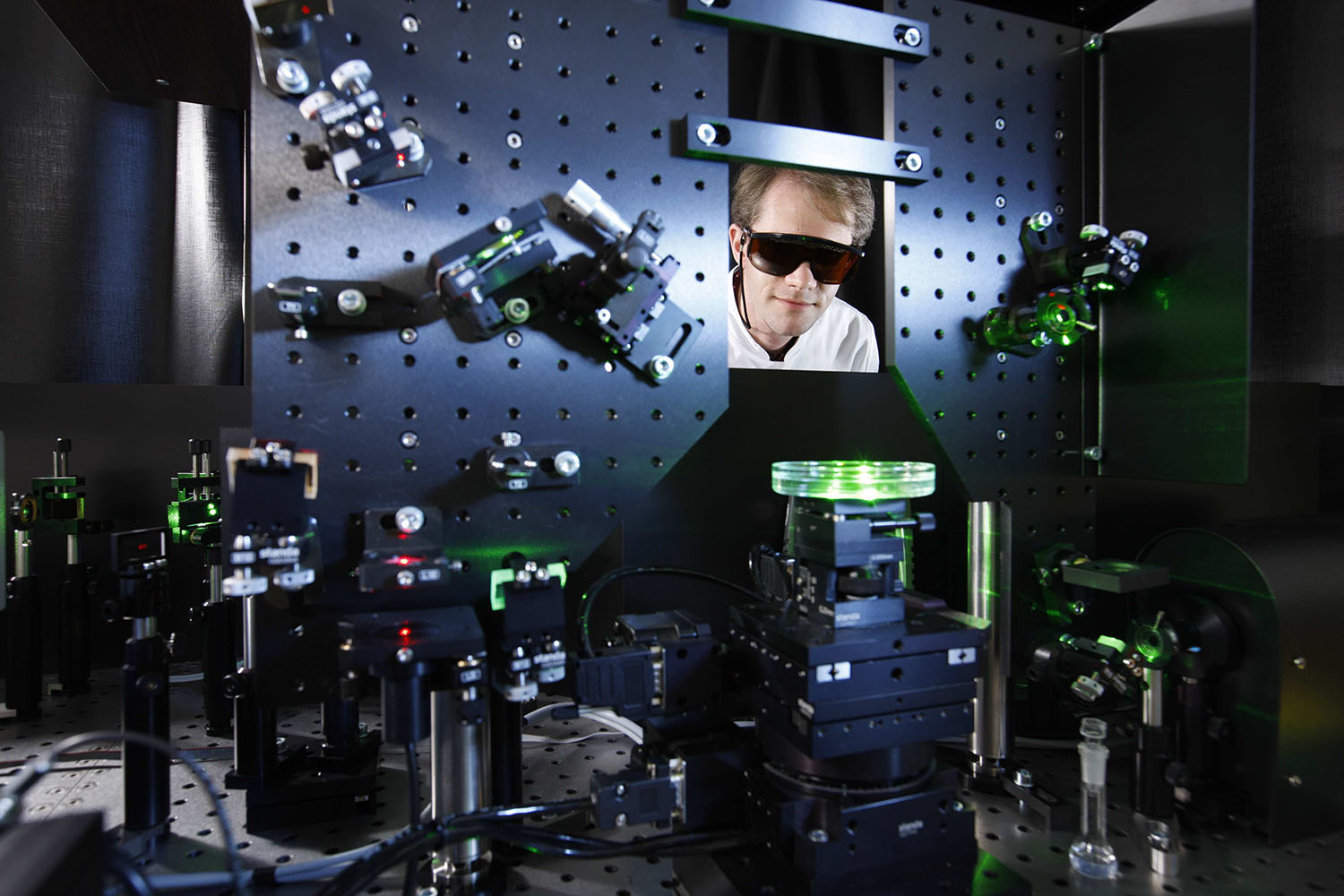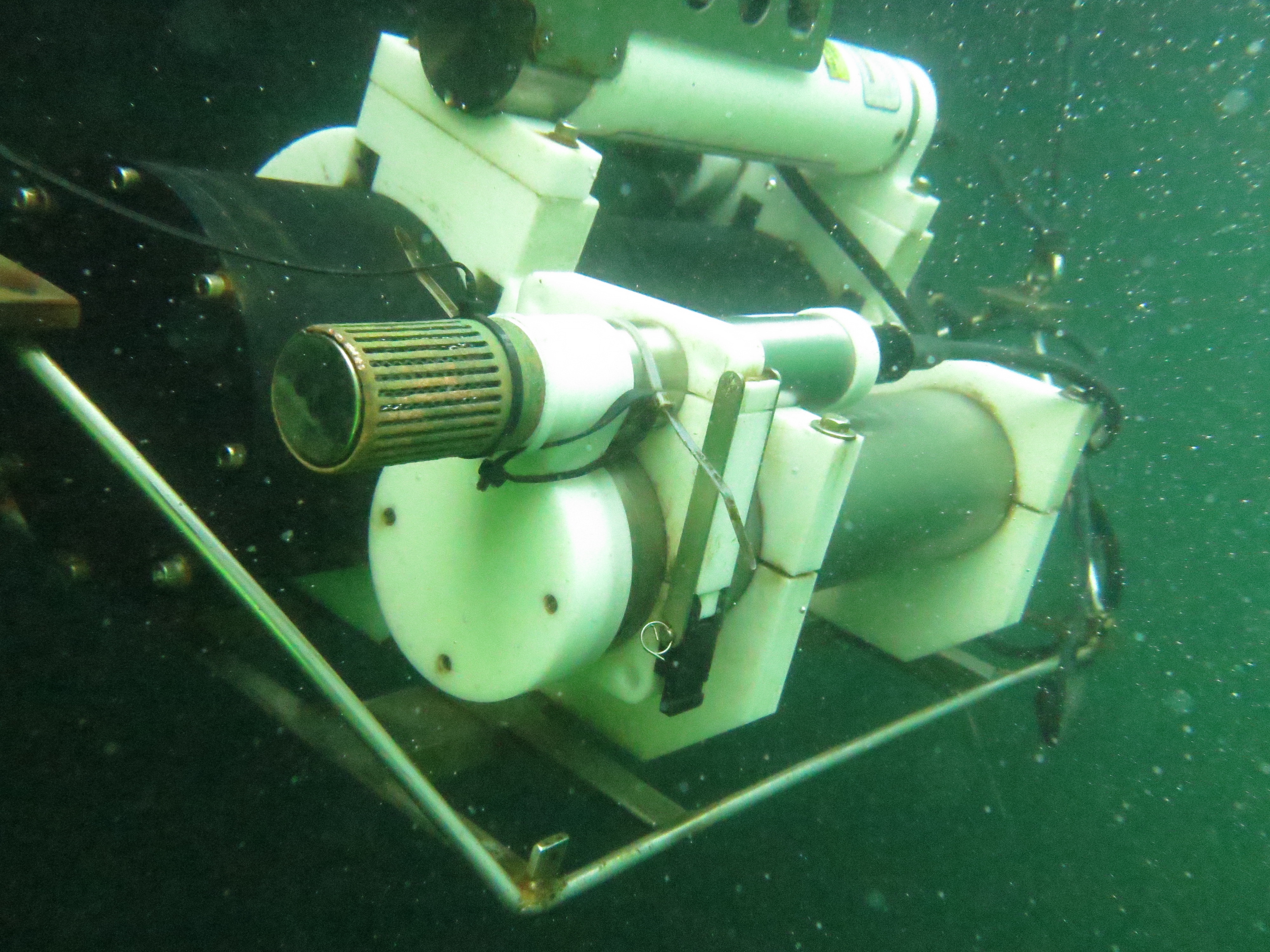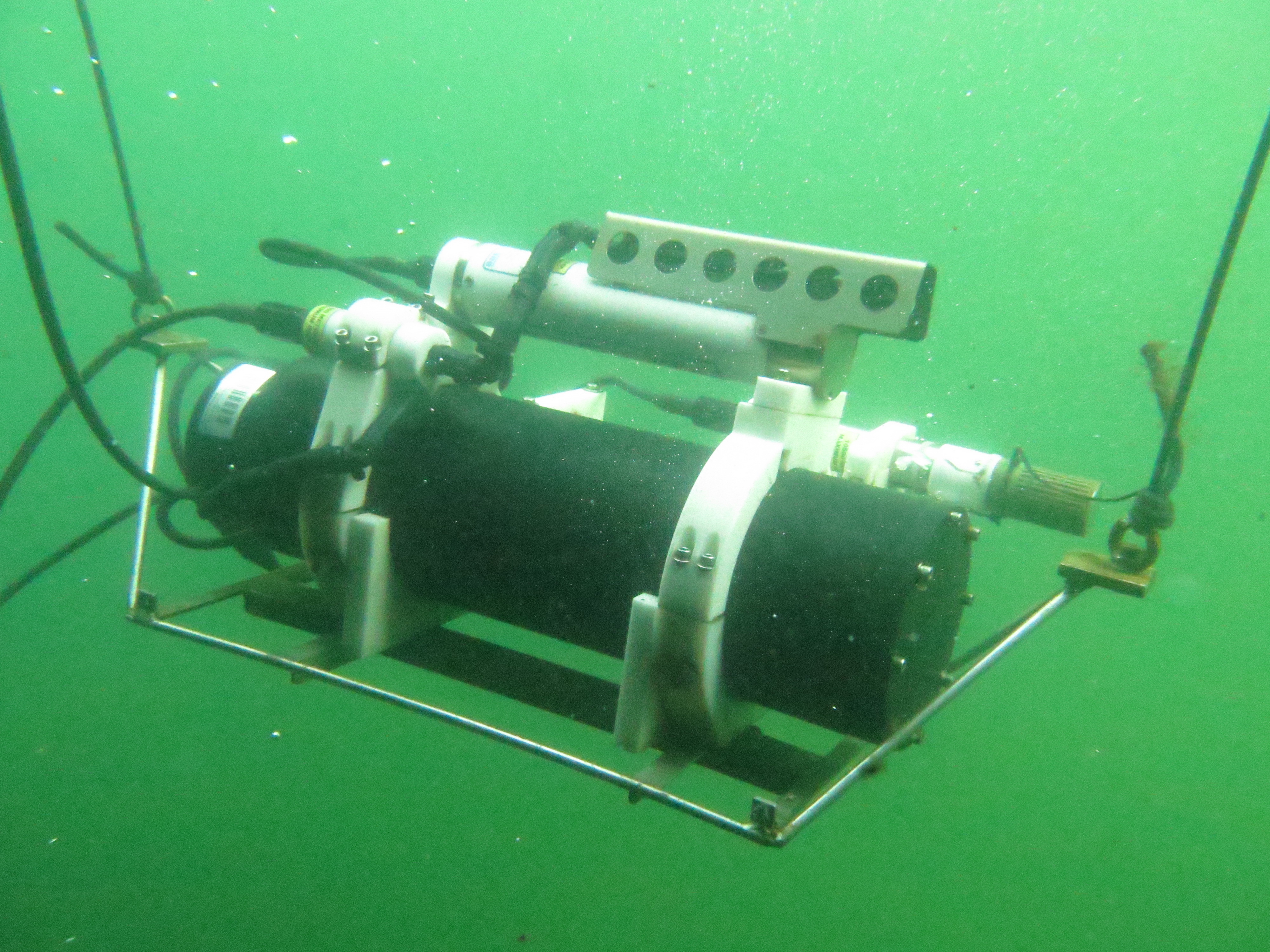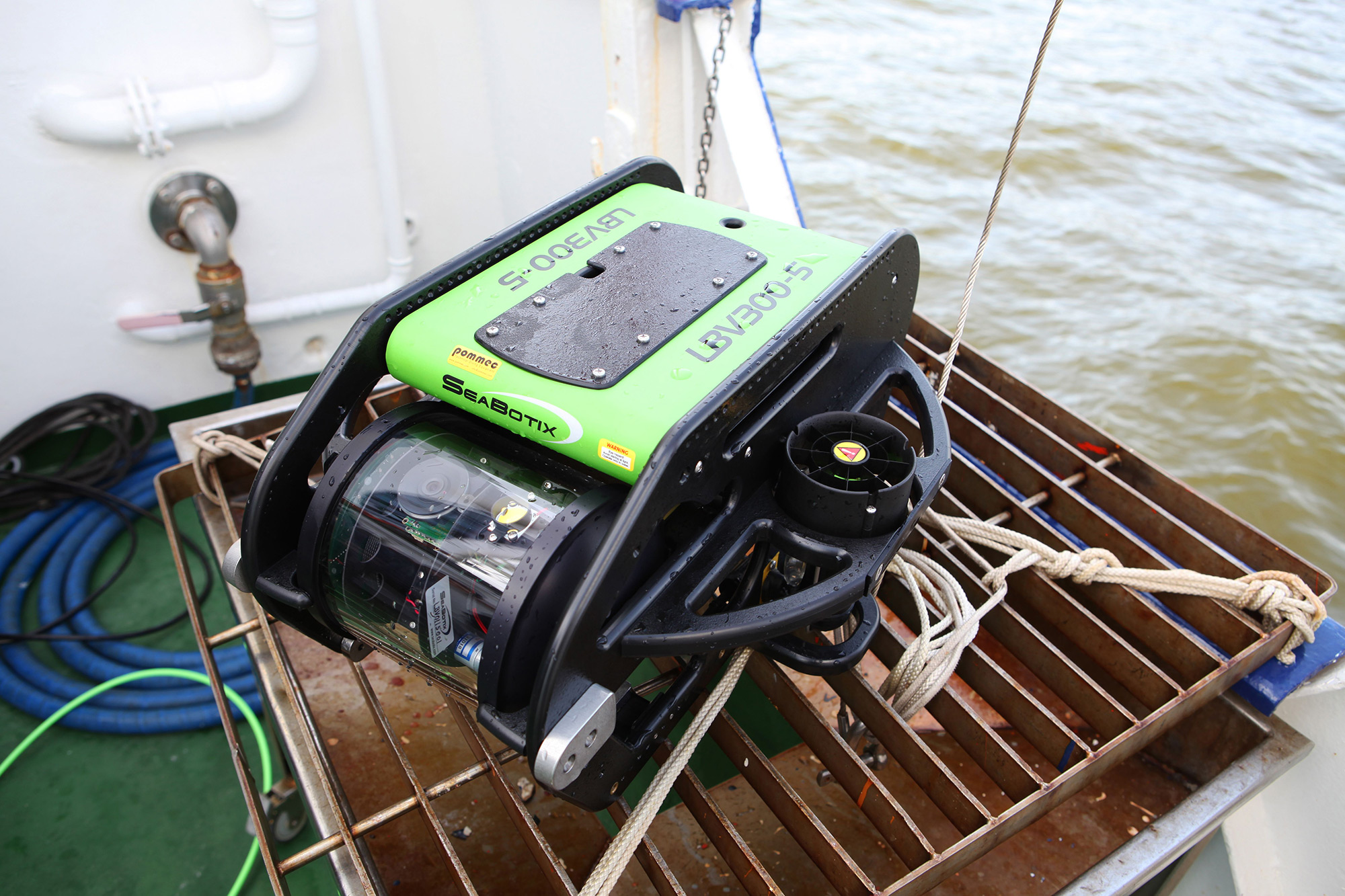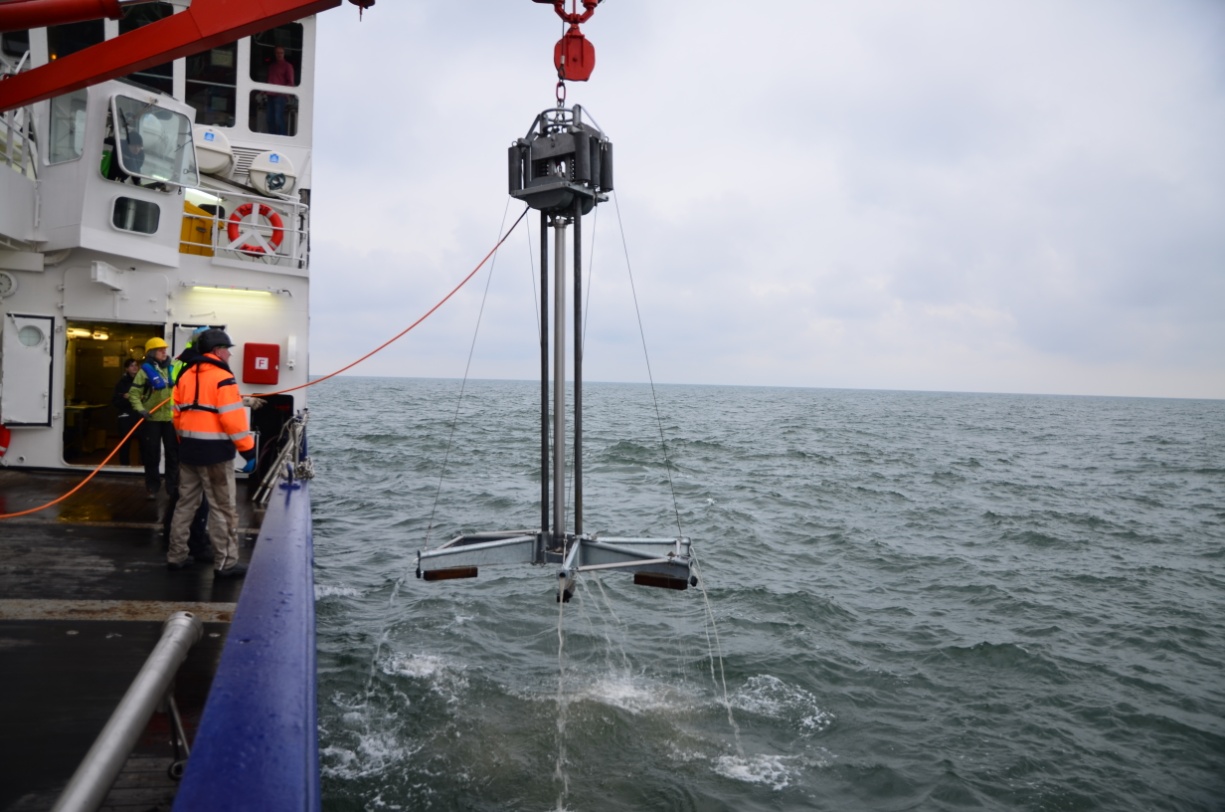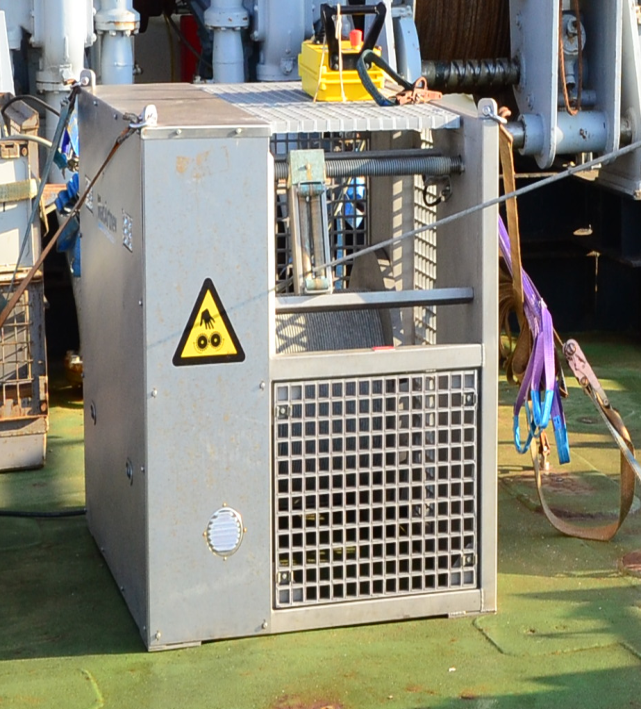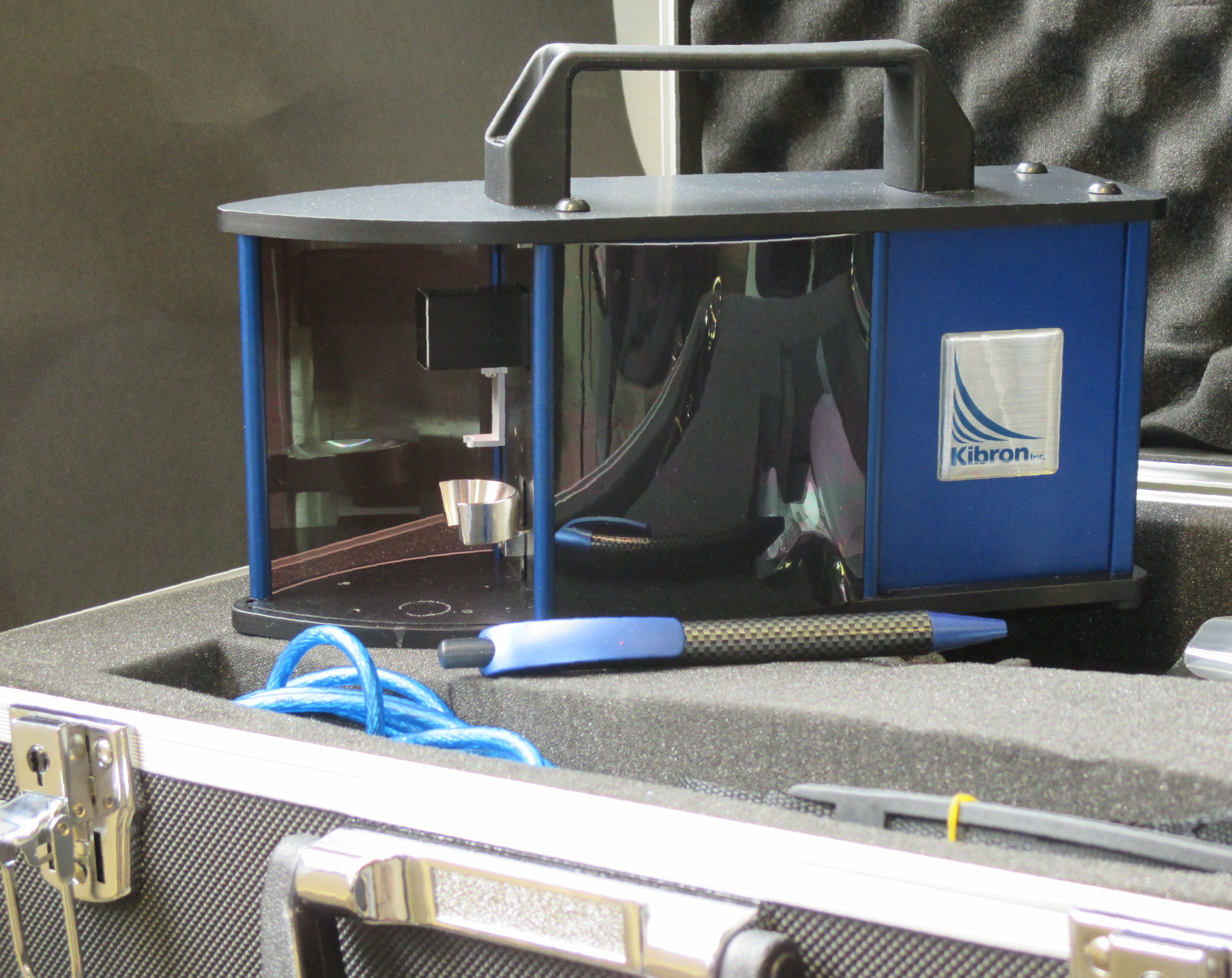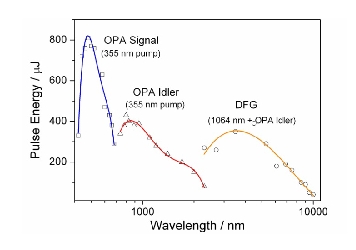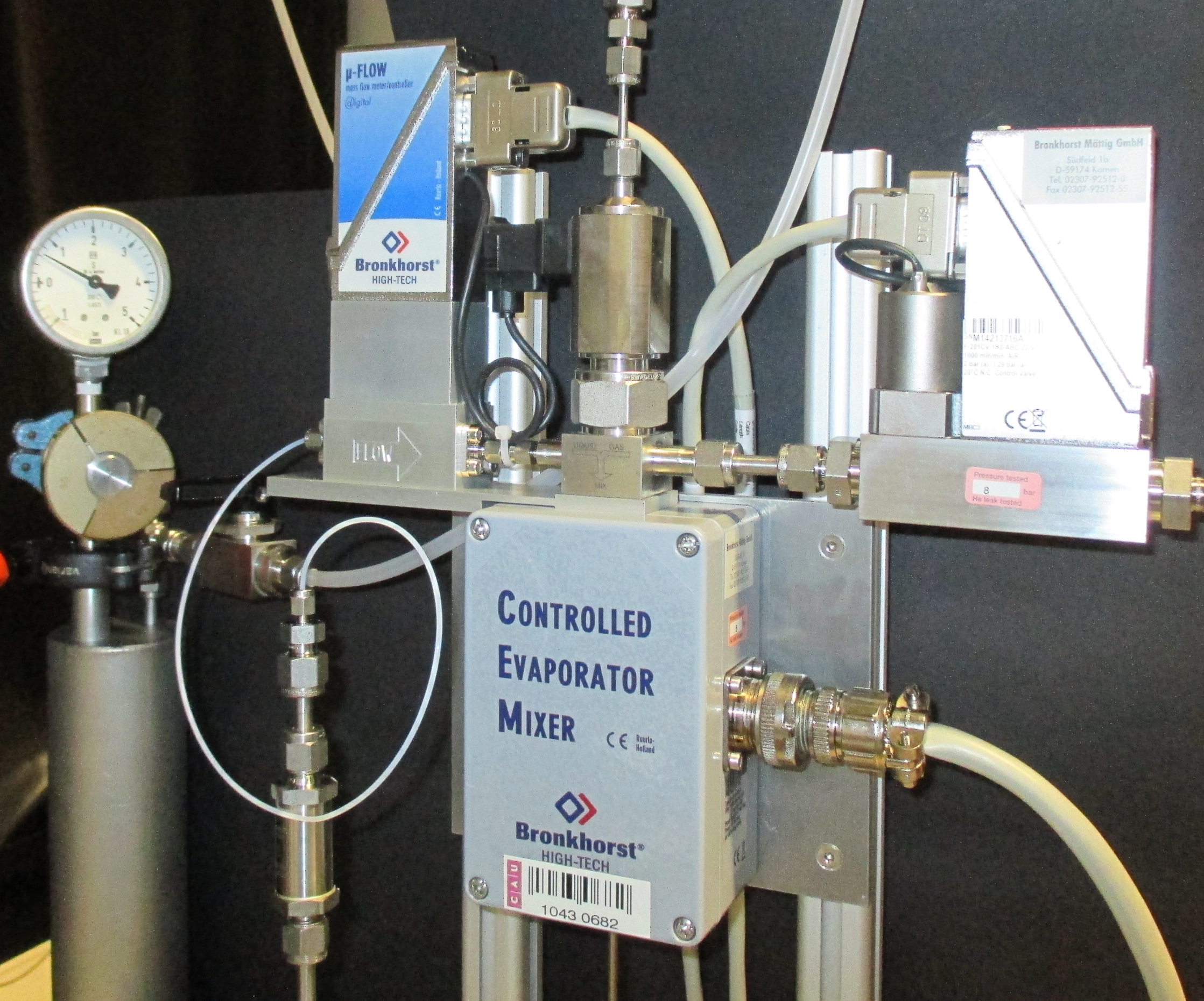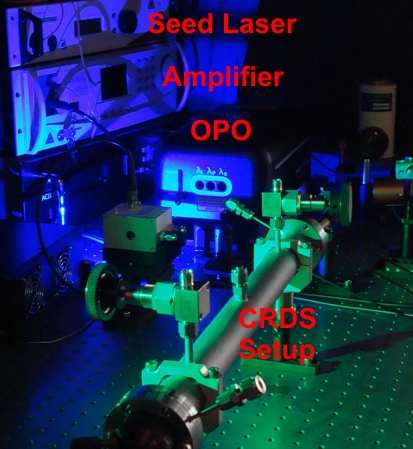- Overview
- Research
- News
- Partner
- Publications
- International Cooperation
- Gender Equality
The ocean interacts with the atmosphere and lithosphere through continuous exchange of matter and energy. Understanding exchange processes across the ocean interfaces is key to unraveling complex interplays such as climate system feedbacks. The relevant processes are determined by a combination of physical, chemical, and biological processes acting on a variety of scales in time and space. Accumulation of organic and inorganic substances, both in the wider boundary layers and in the microlayers directly at the interface, together with intense biological activity, lead to unique heterogeneous physico-chemical and biological properties deviating greatly from bulk seawater conditions. Further modifications of ocean interfaces, e.g., through photochemical and microbial transformations, contribute to forming an environment, in which transfer processes can both be augmented and diminished.
The Research combines state-of-the-art molecular, microbiological and biogeochemical analytical techniques, laser spectroscopy, micro and mesocosm experimentation, in-situ measurements and theoretical modeling. Three research foci of Ocean Interfaces have been set to advance from the at present mostly phenomenological description to a mechanistically sound parameterization of interfacial exchange processes and to improve our process-oriented understanding of selected climate feedback cycles:
Focus 1 investigates formation, retention and emission processes of climate-relevant substances
Focus 2 links biological imprints on extracellular organic matter to interface properties by investigating the accumulation of organic substances and their intense microbial transformation in the surface ocean boundary layer.
Focus 3 investigates (i) chemical aspects of the ocean as a major source and sink for radiatively and chemically active atmospheric trace gases and (ii) the specific roles of the prevalent organic microlayer in sea-air gas exchange processes and as a biochemical reactor.
…
…
Instrumentation
Publications
Ma, X., Bange, H. W.  , Eirund, G. K. and Arévalo-Martínez, D. L.
, Eirund, G. K. and Arévalo-Martínez, D. L.  (2020)
Nitrous oxide and hydroxylamine measurements in the Southwest Indian Ocean.
Journal of Marine Systems, 209
.
Art.Nr. 103062.
DOI 10.1016/j.jmarsys.2018.03.003.
(2020)
Nitrous oxide and hydroxylamine measurements in the Southwest Indian Ocean.
Journal of Marine Systems, 209
.
Art.Nr. 103062.
DOI 10.1016/j.jmarsys.2018.03.003.
Morgan, E. J., Lavric, J. V., Arévalo-Martínez, D. L.  , Bange, H. W.
, Bange, H. W.  , Steinhoff, T., Seifert, T. and Heimann, M.
(2019)
Air–Sea Fluxes of Greenhouse Gases and Oxygen in the Northern Benguela Current Region During Upwelling Events.
, Steinhoff, T., Seifert, T. and Heimann, M.
(2019)
Air–Sea Fluxes of Greenhouse Gases and Oxygen in the Northern Benguela Current Region During Upwelling Events.
![]() Biogeosciences (BG), 16
(20).
pp. 4065-4084.
DOI 10.5194/bg-16-4065-2019.
Biogeosciences (BG), 16
(20).
pp. 4065-4084.
DOI 10.5194/bg-16-4065-2019.
Arévalo-Martínez, D. L.  , Steinhoff, T., Brandt, P.
, Steinhoff, T., Brandt, P.  , Körtzinger, A.
, Körtzinger, A.  , Lamont, T., Rehder, G. and Bange, H. W.
, Lamont, T., Rehder, G. and Bange, H. W.  (2019)
N2O emissions from the northern Benguela upwelling system .
(2019)
N2O emissions from the northern Benguela upwelling system .
![]() Geophysical Research Letters, 46
(6).
pp. 3317-3326.
DOI 10.1029/2018GL081648.
Geophysical Research Letters, 46
(6).
pp. 3317-3326.
DOI 10.1029/2018GL081648.
Lutterbeck, H. E., Arevalo-Martinez, D. L.  , Löscher, C. R. and Bange, H. W.
, Löscher, C. R. and Bange, H. W.  (2018)
Nitric oxide (NO) in the oxygen minimum zone off Peru.
Deep Sea Research Part II: Topical Studies in Oceanography, 156
.
pp. 148-154.
DOI 10.1016/j.dsr2.2017.12.023.
(2018)
Nitric oxide (NO) in the oxygen minimum zone off Peru.
Deep Sea Research Part II: Topical Studies in Oceanography, 156
.
pp. 148-154.
DOI 10.1016/j.dsr2.2017.12.023.
Becker, M., Steinhoff, T. and Körtzinger, A.  (2018)
A detailed view on the seasonality of stable carbon isotopes across the North Atlantic.
(2018)
A detailed view on the seasonality of stable carbon isotopes across the North Atlantic.
![]() Global Biogeochemical Cycles, 32
(9).
pp. 1406-1419.
DOI 10.1029/2018GB005905.
Global Biogeochemical Cycles, 32
(9).
pp. 1406-1419.
DOI 10.1029/2018GB005905.
Engel, A.  , Sperling, M., Sun, C., Grosse, J.
, Sperling, M., Sun, C., Grosse, J.  and Friedrichs, G.
(2018)
Organic Matter in the Surface Microlayer: Insights From a Wind Wave Channel Experiment.
and Friedrichs, G.
(2018)
Organic Matter in the Surface Microlayer: Insights From a Wind Wave Channel Experiment.
![]() Frontiers in Marine Science, 5
.
Art.Nr. 182.
DOI 10.3389/fmars.2018.00182.
Frontiers in Marine Science, 5
.
Art.Nr. 182.
DOI 10.3389/fmars.2018.00182.
Endres, S.  , Maes, F., Hopkins, F., Houghton, K., Mårtensson, E. M., Oeffner, J., Quack, B., Singh, P. and Turner, D.
(2018)
A New Perspective at the Ship-Air-Sea-Interface: The Environmental Impacts of Exhaust Gas Scrubber Discharge.
, Maes, F., Hopkins, F., Houghton, K., Mårtensson, E. M., Oeffner, J., Quack, B., Singh, P. and Turner, D.
(2018)
A New Perspective at the Ship-Air-Sea-Interface: The Environmental Impacts of Exhaust Gas Scrubber Discharge.
![]() Frontiers in Marine Science, 5
.
Art.Nr. 139.
DOI 10.3389/fmars.2018.00139.
Frontiers in Marine Science, 5
.
Art.Nr. 139.
DOI 10.3389/fmars.2018.00139.
Arévalo-Martínez, D. L.  and Bange, H.
and Bange, H.  (2018)
Better, faster, more clean: Perspectives on
nitrous oxide measurements in the ocean.
(2018)
Better, faster, more clean: Perspectives on
nitrous oxide measurements in the ocean.
![]() [Poster]
In: Research Alumni Conference Frontiers in Ocean Sustainability: Co-designing Research and Solutions. , 19.-21.09.2018, Halifax, Canada .
[Poster]
In: Research Alumni Conference Frontiers in Ocean Sustainability: Co-designing Research and Solutions. , 19.-21.09.2018, Halifax, Canada .
Dreshchinskii, A. and Engel, A.  (2017)
Seasonal variations of the sea surface microlayer at the Boknis Eck Times Series Station (Baltic Sea).
(2017)
Seasonal variations of the sea surface microlayer at the Boknis Eck Times Series Station (Baltic Sea).
![]() Journal of Plankton Research, 39
(6).
pp. 943-961.
DOI 10.1093/plankt/fbx055.
Journal of Plankton Research, 39
(6).
pp. 943-961.
DOI 10.1093/plankt/fbx055.
Friedrichs, G., Wahl, M.  and Fischer, M.
Antragsteller/Inhaber: Christian-Albrechts-Universität zu Kiel ; GEOMAR Helmholtz-Zentrum für Ozeanforschung Kiel
(2017)
Großflächiger Biofilmsensor.
and Fischer, M.
Antragsteller/Inhaber: Christian-Albrechts-Universität zu Kiel ; GEOMAR Helmholtz-Zentrum für Ozeanforschung Kiel
(2017)
Großflächiger Biofilmsensor.
![]() DE102011101934.A1 ( Patent )
Publication
DE102011101934.A1 ( Patent )
Publication
Bezard, R., Turner, S., Davidson, J., Schmitt, A. K. and Lindsay, J. (2017) Origin and Evolution of Silicic Magmas in Oceanic Arcs; an in situ Study from St Lucia, Lesser Antilles. Journal of Petrology, 58 (7). pp. 1279-1318. DOI 10.1093/petrology/egx053.
Engel, A.  , Bange, H. W.
, Bange, H. W.  , Cunliffe, M., Burrows, S. M., Friedrichs, G., Galgani, L., Herrmann, H., Hertkorn, N., Johnson, M., Liss, P. S., Quinn, P. K., Schartau, M.
, Cunliffe, M., Burrows, S. M., Friedrichs, G., Galgani, L., Herrmann, H., Hertkorn, N., Johnson, M., Liss, P. S., Quinn, P. K., Schartau, M.  , Soloviev, A., Stolle, C., Upstill-Goddard, R. C., van Pinxteren, M. and Zäncker, B.
(2017)
The Ocean's Vital Skin: Toward an Integrated Understanding of the Sea Surface Microlayer.
, Soloviev, A., Stolle, C., Upstill-Goddard, R. C., van Pinxteren, M. and Zäncker, B.
(2017)
The Ocean's Vital Skin: Toward an Integrated Understanding of the Sea Surface Microlayer.
![]() Frontiers in Marine Science, 4
.
Art.Nr. 165.
DOI 10.3389/fmars.2017.00165.
Frontiers in Marine Science, 4
.
Art.Nr. 165.
DOI 10.3389/fmars.2017.00165.
Steinle, L., Maltby, J., Treude, T.  , Kock, A.
, Kock, A.  , Bange, H. W.
, Bange, H. W.  , Engbersen, N., Zopfi, J., Lehmann, M. F. and Niemann, H.
(2017)
Effects of low oxygen concentrations on aerobic methane oxidation in seasonally hypoxic coastal waters.
, Engbersen, N., Zopfi, J., Lehmann, M. F. and Niemann, H.
(2017)
Effects of low oxygen concentrations on aerobic methane oxidation in seasonally hypoxic coastal waters.
![]() Biogeosciences (BG), 14
(6).
pp. 1631-1645.
DOI 10.5194/bg-14-1631-2017.
Biogeosciences (BG), 14
(6).
pp. 1631-1645.
DOI 10.5194/bg-14-1631-2017.
Arevalo-Martinez, D. L.  , Kock, A.
, Kock, A.  , Steinhoff, T., Brandt, P.
, Steinhoff, T., Brandt, P.  , Dengler, M.
, Dengler, M.  , Fischer, T.
, Fischer, T.  , Körtzinger, A.
, Körtzinger, A.  and Bange, H. W.
and Bange, H. W.  (2017)
Nitrous oxide during the onset of the Atlantic Cold Tongue.
(2017)
Nitrous oxide during the onset of the Atlantic Cold Tongue.
![]() Journal of Geophysical Research: Oceans, 122
(1).
pp. 171-184.
DOI 10.1002/2016JC012238.
Journal of Geophysical Research: Oceans, 122
(1).
pp. 171-184.
DOI 10.1002/2016JC012238.
Friedrichs, G. (2017) The NCN Pathway for Prompt-NO Formation: Closing in on a Final Solution. [Talk] In: 33rd Symp. on Chemical Kinetics and Dynamics. , 7 - 9 June 2017, Nagoya, Japan .
Sadiek, I. M. and Friedrichs, G. (2017) Doppler-limited high-resolution spectrum and VPT2 assisted assignment of the C-H stretch of CH2Br2. Spectrochimica Acta Part A: Molecular and Biomolecular Spectroscopy, 181 . pp. 180-191. DOI 10.1016/j.saa.2017.03.027.
Sadiek, I., Shi, Q., Wallace, D. W. R. and Friedrichs, G. (2017) Quantitative Mid-Infrared Cavity Ringdown Detection of Methyl Iodide for Monitoring Applications. Analytical Chemistry, 89 (16). pp. 8445-8452. DOI 10.1021/acs.analchem.7b01970.
Voyiatzis, E., Hartke, B. and Friedrichs, G. (2017) Molecular modelling of organic nanolayer effects on air-sea mass flux. [Poster] In: Frontiers in ocean-atmosphere exchange (Workshop on Air sea interface and fluxes of mass and energy). , May 2017, Cargèse, Corsica, France .
Vehmaa, A., Almen, A. K., Brutemark, A., Paul, A. J., Riebesell, U.  , Furuhagen, S. and Engström-Öst, J.
(2016)
Ocean acidification challenges copepod phenotypic plasticity.
, Furuhagen, S. and Engström-Öst, J.
(2016)
Ocean acidification challenges copepod phenotypic plasticity.
![]() Biogeosciences (BG), 13
(22).
pp. 6171-6182.
DOI 10.5194/bg-13-6171-2016.
Biogeosciences (BG), 13
(22).
pp. 6171-6182.
DOI 10.5194/bg-13-6171-2016.
Geersen, J.  , Scholz, F., Linke, P.
, Scholz, F., Linke, P.  , Schmidt, M.
, Schmidt, M.  , Lange, D.
, Lange, D.  , Behrmann, J. H.
, Behrmann, J. H.  , Völker, D. and Hensen, C.
, Völker, D. and Hensen, C.  (2016)
Fault zone controlled seafloor methane seepage in the rupture area of the 2010 Maule Earthquake, Central Chile.
(2016)
Fault zone controlled seafloor methane seepage in the rupture area of the 2010 Maule Earthquake, Central Chile.
![]() Geochemistry, Geophysics, Geosystems, 17
(11).
pp. 4802-4813.
DOI 10.1002/2016GC006498.
Geochemistry, Geophysics, Geosystems, 17
(11).
pp. 4802-4813.
DOI 10.1002/2016GC006498.
Steinle, L., Schmidt, M.  , Bryant, L. D., Haeckel, M.
, Bryant, L. D., Haeckel, M.  , Linke, P.
, Linke, P.  , Sommer, S., Zopfi, J., Lehmann, M. F., Treude, T.
, Sommer, S., Zopfi, J., Lehmann, M. F., Treude, T.  and Niemann, H.
(2016)
Linked sediment and water-column methanotrophy at a man-made gas blowout in the North Sea: Implications for methane budgeting in seasonally stratified shallow seas.
and Niemann, H.
(2016)
Linked sediment and water-column methanotrophy at a man-made gas blowout in the North Sea: Implications for methane budgeting in seasonally stratified shallow seas.
![]() Limnology and Oceanography, 61
(S1).
S367-S386.
DOI 10.1002/lno.10388.
Limnology and Oceanography, 61
(S1).
S367-S386.
DOI 10.1002/lno.10388.
Saha, M.  , Wiese, J.
, Wiese, J.  , Weinberger, F.
, Weinberger, F.  and Wahl, M.
and Wahl, M.  (2016)
Rapid adaptation to controlling new microbial epibionts in the invaded range promotes invasiveness of an exotic seaweed.
Journal of Ecology, 104
(4).
pp. 969-978.
DOI 10.1111/1365-2745.12590.
(2016)
Rapid adaptation to controlling new microbial epibionts in the invaded range promotes invasiveness of an exotic seaweed.
Journal of Ecology, 104
(4).
pp. 969-978.
DOI 10.1111/1365-2745.12590.
Böning, C. W.  , Behrens, E., Biastoch, A.
, Behrens, E., Biastoch, A.  , Getzlaff, K.
, Getzlaff, K.  and Bamber, J. L.
(2016)
Emerging impact of Greenland meltwater on deepwater formation in the North Atlantic Ocean.
Nature Geoscience, 9
(7).
pp. 523-527.
DOI 10.1038/ngeo2740.
and Bamber, J. L.
(2016)
Emerging impact of Greenland meltwater on deepwater formation in the North Atlantic Ocean.
Nature Geoscience, 9
(7).
pp. 523-527.
DOI 10.1038/ngeo2740.
Rovelli, L., Dengler, M.  , Schmidt, M.
, Schmidt, M.  , Sommer, S., Linke, P.
, Sommer, S., Linke, P.  and McGinnis, D.
(2016)
Thermocline mixing and vertical oxygen fluxes in the stratified central North Sea.
and McGinnis, D.
(2016)
Thermocline mixing and vertical oxygen fluxes in the stratified central North Sea.
![]() Biogeosciences (BG), 13
(5).
pp. 1609-1620.
DOI 10.5194/bg-13-1609-2016.
Biogeosciences (BG), 13
(5).
pp. 1609-1620.
DOI 10.5194/bg-13-1609-2016.
Nauendorf, A., Krause, S., Bigalke, N. K., Gorb, E. V., Gorb, S., Haeckel, M.  , Wahl, M.
, Wahl, M.  and Treude, T.
and Treude, T.  (2016)
Microbial colonization and degradation of polyethylene and biodegradable plastic bags in temperate fine-grained organic-rich marine sediments.
Marine Pollution Bulletin, 103
(1-2).
pp. 168-178.
DOI 10.1016/j.marpolbul.2015.12.024.
(2016)
Microbial colonization and degradation of polyethylene and biodegradable plastic bags in temperate fine-grained organic-rich marine sediments.
Marine Pollution Bulletin, 103
(1-2).
pp. 168-178.
DOI 10.1016/j.marpolbul.2015.12.024.
Dabrowski, A., Kleber, J. and Friedrichs, G. (2016) Structure-reactivity trend for the ozonolysis of fatty acid monolayers with shifted double bond position. [Poster] In: 24th Int. Symp. on Gas Kinetics and Related Phenomena. , July 2016, York, UK .
Muñoz, P., Cárdenas, L. J., Garbe-Schönberg, D., Sellanes, J., Dezileau, L., Melville, I. and Mendes, S. D. (2016) Geochemical characterization of two distinctive systems with evidence of chemosynthetic activity, explored at the SE Pacific margin off Chile (46°S and 33°S). Progress in Oceanography, 148 . pp. 26-43. DOI 10.1016/j.pocean.2016.09.002.
Sadiek, I. and Friedrichs, G. (2016) Saturation dynamics and working limits of saturated absorption cavity ringdown spectroscopy. Physical Chemistry Chemical Physics, 18 (33). pp. 22978-22989. DOI 10.1039/C6CP01966H.
Sadiek, I. M. and Friedrichs, G. (2016) High-Resolution Spectrum of the Asymmetric C-H Stretch of CH2Br2: CRDS Measurements and Simulations. [Poster] In: Bunsentagung 2016. , 05.-07.05.2016, Rostock, Germany .
Schwarzer, K., Thanh, N. C. and Ricklefs, K. (2016) Sediment re-deposition in the mangrove environment of Can Gio, Saigon River estuary (Vietnam). Journal of Coastal Research, 75 . pp. 138-142. DOI 10.2112/si75-028.1.
Löscher, C., Fischer, M. A., Neulinger, S., Fiedler, B., Philippi, M., Schütte, F., Singh, A., Hauss, H.  , Karstensen, J.
, Karstensen, J.  , Körtzinger, A.
, Körtzinger, A.  , Künzel, S. and Schmitz, R. A.
(2015)
Hidden biosphere in an oxygen-deficient Atlantic open ocean eddy: future implications of ocean deoxygenation on primary production in the eastern tropical North Atlantic.
, Künzel, S. and Schmitz, R. A.
(2015)
Hidden biosphere in an oxygen-deficient Atlantic open ocean eddy: future implications of ocean deoxygenation on primary production in the eastern tropical North Atlantic.
![]() Biogeosciences (BG), 12
(16).
pp. 7467-7482.
DOI 10.5194/bg-12-7467-2015.
Biogeosciences (BG), 12
(16).
pp. 7467-7482.
DOI 10.5194/bg-12-7467-2015.
Friedrichs, G., Schneider, A. and Bange, H. W.  (2015)
Marine Applications for a Promising New Spectroscopic Method.
(2015)
Marine Applications for a Promising New Spectroscopic Method.
![]() Eos: Earth & Space Science News, 96
.
DOI 10.1029/2015EO040395.
Eos: Earth & Space Science News, 96
.
DOI 10.1029/2015EO040395.
Leifer, I., Solomon, E., Schneider von Deimling, J., Rehder, G., Coffin, R. and Linke, P.  (2015)
The Fate of Bubbles in a Large, Intense Bubble Megaplume for Stratified and Unstratified Water : Numerical Simulations of 22/4b Expedition Field Data.
Marine and Petroleum Geology, 68
.
pp. 806-823.
DOI 10.1016/j.marpetgeo.2015.07.025.
(2015)
The Fate of Bubbles in a Large, Intense Bubble Megaplume for Stratified and Unstratified Water : Numerical Simulations of 22/4b Expedition Field Data.
Marine and Petroleum Geology, 68
.
pp. 806-823.
DOI 10.1016/j.marpetgeo.2015.07.025.
Nauw, J., Linke, P.  and Leifer, I.
(2015)
Bubble momentum plume as a possible mechanism for an early breakdown of the seasonal stratification in the northern North Sea.
Marine and Petroleum Geology, 68
.
pp. 789-805.
DOI 10.1016/j.marpetgeo.2015.05.003.
and Leifer, I.
(2015)
Bubble momentum plume as a possible mechanism for an early breakdown of the seasonal stratification in the northern North Sea.
Marine and Petroleum Geology, 68
.
pp. 789-805.
DOI 10.1016/j.marpetgeo.2015.05.003.
Vielstädte, L., Karstens, J.  , Haeckel, M.
, Haeckel, M.  , Schmidt, M.
, Schmidt, M.  , Linke, P.
, Linke, P.  , Reimann, S., Liebetrau, V., McGinnis, D. and Wallmann, K.
, Reimann, S., Liebetrau, V., McGinnis, D. and Wallmann, K.  (2015)
Quantification of methane emissions at abandoned gas wells in the Central North Sea.
Marine and Petroleum Geology, 68
.
pp. 848-860.
DOI 10.1016/j.marpetgeo.2015.07.030.
(2015)
Quantification of methane emissions at abandoned gas wells in the Central North Sea.
Marine and Petroleum Geology, 68
.
pp. 848-860.
DOI 10.1016/j.marpetgeo.2015.07.030.
Wilfert, P., Krause, S., Liebetrau, V., Schönfeld, J., Haeckel, M.  , Linke, P.
, Linke, P.  and Treude, T.
and Treude, T.  (2015)
Response of anaerobic methanotrophs and benthic foraminifera on 20 years of methane emission from a gas blowout in the North Sea.
Marine and Petroleum Geology, 68
.
pp. 731-742.
DOI 10.1016/j.marpetgeo.2015.07.012.
(2015)
Response of anaerobic methanotrophs and benthic foraminifera on 20 years of methane emission from a gas blowout in the North Sea.
Marine and Petroleum Geology, 68
.
pp. 731-742.
DOI 10.1016/j.marpetgeo.2015.07.012.
Steeb, P., Krause, S., Linke, P.  , Hensen, C.
, Hensen, C.  , Dale, A. W.
, Dale, A. W.  , Nuzzo, M. and Treude, T.
, Nuzzo, M. and Treude, T.  (2015)
Efficiency and adaptability of the benthic methane filter at Quepos Slide cold seeps, offshore Costa Rica.
(2015)
Efficiency and adaptability of the benthic methane filter at Quepos Slide cold seeps, offshore Costa Rica.
![]() Biogeosciences (BG), 12
.
pp. 6687-6706.
DOI 10.5194/bg-12-6687-2015.
Biogeosciences (BG), 12
.
pp. 6687-6706.
DOI 10.5194/bg-12-6687-2015.
Singh, A., Baer, S. E., Riebesell, U.  , Martiny, A. C. and Lomas, M. W.
(2015)
C : N : P stoichiometry at the Bermuda Atlantic Time-series Study station in the North Atlantic Ocean.
, Martiny, A. C. and Lomas, M. W.
(2015)
C : N : P stoichiometry at the Bermuda Atlantic Time-series Study station in the North Atlantic Ocean.
![]() Biogeosciences (BG), 12
(21).
pp. 6389-6403.
DOI 10.5194/bg-12-6389-2015.
Biogeosciences (BG), 12
(21).
pp. 6389-6403.
DOI 10.5194/bg-12-6389-2015.
Arevalo-Martínez, D. L.  , Kock, A.
, Kock, A.  , Löscher, C., Schmitz, R. A. and Bange, H. W.
, Löscher, C., Schmitz, R. A. and Bange, H. W.  (2015)
Massive nitrous oxide emissions from the tropical South Pacific Ocean.
Nature Geoscience, 8
(7).
pp. 530-533.
DOI 10.1038/ngeo2469.
(2015)
Massive nitrous oxide emissions from the tropical South Pacific Ocean.
Nature Geoscience, 8
(7).
pp. 530-533.
DOI 10.1038/ngeo2469.
Schmale, O., Leifer, I., Schneider von Deimling, J., Stolle, C., Krause, S., Kießlich, K., Fram, A. and Treude, T.  (2015)
Bubble transport Mechanism: Indications for a gas bubble-mediated inoculation of benthic methanothrophs into the water column.
Continental Shelf Research, 103
.
pp. 70-78.
DOI 10.1016/j.csr.2015.04.022.
(2015)
Bubble transport Mechanism: Indications for a gas bubble-mediated inoculation of benthic methanothrophs into the water column.
Continental Shelf Research, 103
.
pp. 70-78.
DOI 10.1016/j.csr.2015.04.022.
Rovelli, L., Attard, K. M., Bryant, L. D., Flögel, S., Stahl, H. J., Roberts, M., Linke, P.  and Glud, R. N.
(2015)
Benthic O2 uptake of two cold-water coral communities estimated with the non-invasive eddy-correlation technique.
and Glud, R. N.
(2015)
Benthic O2 uptake of two cold-water coral communities estimated with the non-invasive eddy-correlation technique.
![]() Marine Ecology Progress Series, 525
.
pp. 97-104.
DOI 10.3354/meps11211.
Marine Ecology Progress Series, 525
.
pp. 97-104.
DOI 10.3354/meps11211.
Buchs, D. M., Cukur, D., Masago, H. and Garbe-Schönberg, D. (2015) Sediment flow routing during formation of forearc basins: Constraints from integrated analysis of detrital pyroxenes and stratigraphy in the Kumano Basin, Japan. Earth and Planetary Science Letters, 414 . pp. 164-175. DOI 10.1016/j.epsl.2014.12.046.
Singh, A., Gandhi, N., Ramesh, R. and Prakash, S. (2015) Role of Cyclonic Eddy in enhancing Primary and New production in the Bay of Bengal. Journal of Sea Research, 97 . pp. 5-13. DOI 10.1016/j.seares.2014.12.002.
Goericke, R., Bograd, S. J. and Grundle, D. (2015) Denitrification and flushing of the Santa Barbara Basin bottom waters. Deep Sea Research Part II: Topical Studies in Oceanography, 112 . pp. 53-60. DOI 10.1016/j.dsr2.2014.07.012.
Schmidt, M.  , Linke, P.
, Linke, P.  , Sommer, S., Esser, D. and Cherednichenko, S.
(2015)
Natural CO2 seeps offshore Panarea – A test site for subsea CO2 leak detection technology.
Marine Technology Society Journal, 49
(1).
pp. 19-30.
DOI 10.4031/MTSJ.49.1.3.
, Sommer, S., Esser, D. and Cherednichenko, S.
(2015)
Natural CO2 seeps offshore Panarea – A test site for subsea CO2 leak detection technology.
Marine Technology Society Journal, 49
(1).
pp. 19-30.
DOI 10.4031/MTSJ.49.1.3.
Singh, A. and Ramesh, R. (2015) Environmental controls on new and primary production in the northern Indian Ocean. Progress in Oceanography, 131 . pp. 138-145. DOI 10.1016/j.pocean.2014.12.006.
Bauersachs, T., Rochelmeier, J. and Schwark, L. (2015) Seasonal lake surface water temperature trends reflected by heterocyst glycolipid-based molecular thermometers. Biogeosciences (BG), 12 (12). pp. 3741-3751. DOI 10.5194/bgd-12-751-2015.
Dabrowski, A., Kleber, J., Laß, K. and Friedrichs, G. (2015) Heterogeneous Ozone Oxidation of Unsaturated Fatty Acid Monolayers at the Water-Air Interface. [Poster] In: SOLAS Open Science Conference. , 07.-11.09.2015, Kiel, Germany .
Drotlef, D. M., Appel, E., Peisker, H., Dening, K., del Campo, A., Gorb, S. and Barnes, W. J. P. (2015) Morphological studies of the toe pads of the rock frog, Staurois parvus (family: Ranidae) and their relevance to the development of new biomimetically inspired reversible adhesives. Interface Focus, 5 (1). DOI 10.1098/rsfs.2014.0036.
Eggs, B., Wolff, J. O., Kuhn-Nentwig, L., Gorb, S. and Nentwig, W. (2015) Hunting Without a Web: How Lycosoid Spiders Subdue their Prey. Ethology, 121 (12). pp. 1166-1177. DOI 10.1111/eth.12432.
Fleury, S., Martinez, P., Crosta, X., Charlier, K., Billy, I., Hanquiez, V., Blanz, T. and Schneider, R. (2015) Pervasive multidecadal variations in productivity within the Peruvian Upwelling System over the last millennium. Quaternary Science Reviews, 125 . pp. 78-90. DOI 10.1016/j.quascirev.2015.08.006.
Friedemann, K., Kunert, G., Gorb, E., Gorb, S. and Beutel, R. G. (2015) Attachment forces of pea aphids (Acyrthosiphon pisum) on different legume species. Ecological Entomology, 40 (6). pp. 732-740. DOI 10.1111/een.12249.
Friedrichs, G., Laß, K., Dabrowski, J. and Kleber, J. (2015) Combining VSFG Spectroscopy and Surface Pressure Measurements to Study O3 Oxidation of Unsaturated Fatty Acids at the Water-Air Interface. [Talk] In: SFS Workshop. , April 2015, Wiebaden-Naurod, Germany .
Laß, K., Kleber, J., Bange, H. W.  and Friedrichs, G.
(2015)
Recent Advances in Microlayer Monitoring and Surface Reactivity Studies Using Sum-Frequency Generation Spectroscopy.
[Poster]
In: The Ocean Surface Microlayer and Biogeochemical Feedbacks in the Earth System workshop, Ocean Interfaces semester topic Future Ocean. , 01.-03.07.2015, Kiel, Germany .
and Friedrichs, G.
(2015)
Recent Advances in Microlayer Monitoring and Surface Reactivity Studies Using Sum-Frequency Generation Spectroscopy.
[Poster]
In: The Ocean Surface Microlayer and Biogeochemical Feedbacks in the Earth System workshop, Ocean Interfaces semester topic Future Ocean. , 01.-03.07.2015, Kiel, Germany .
Laß, K., Kleber, J., Bange, H. W.  and Friedrichs, G.
(2015)
The Sea Surface in Vibrational Sum Frequency Generation Spectra: Natural Samples, Lab Proxies and Environmental Monitoring.
[Poster]
In: SFS Workshop 2015. , 30.03.-01.04.2015, Wiebaden-Naurod, Germany .
and Friedrichs, G.
(2015)
The Sea Surface in Vibrational Sum Frequency Generation Spectra: Natural Samples, Lab Proxies and Environmental Monitoring.
[Poster]
In: SFS Workshop 2015. , 30.03.-01.04.2015, Wiebaden-Naurod, Germany .
Laß, K., Kleber, J., Bange, H. W.  and Friedrichs, G.
(2015)
Sum-Frequency Generation Spectroscopy for Studying Organic Layers at Water-Air Interfaces: Microlayer Monitoring and Surface Reactivity.
[Talk]
In: Geosciences Union (EGU) General Assembly 2015. , 12.–17.04.2015, Vienna, Austria .
and Friedrichs, G.
(2015)
Sum-Frequency Generation Spectroscopy for Studying Organic Layers at Water-Air Interfaces: Microlayer Monitoring and Surface Reactivity.
[Talk]
In: Geosciences Union (EGU) General Assembly 2015. , 12.–17.04.2015, Vienna, Austria .
Piller, I. and Friedrichs, G. (2015) Monitoring of Adsorbed Polar Substances at the Quartz-Air interface Using ew-CRDS. [Poster] In: Marine Applications and Perspectives of Cavity Enhanced Optical Detection Schemes. , 20.-21.04.2015, Kiel, Germany .
Piller, I. and Friedrichs, G. (2015) A novel NIR ew-cw-CRD spectrometer for investigating heterogeneous processes at the quartz-air/water interface: Characterization and first measurements. [Poster] In: 1th International User Meeting on Cavity Enhanced Spectroscopy . , June 2015, Boulder, USA .
Sadiek, I. M. and Friedrichs, G. (2015) Implementation of Saturated Cavity Ringdown Spectroscopy: First Results and Working Limits. [Poster] In: Marine Applications and Perspectives of Cavity Enhanced Optical Detection Schemes. , 20.-21.04.2015, Kiel, Germany .
Sadiek, I. M. and Friedrichs, G. (2015) Saturation Dynamics and Working Regimes of Saturated Absorption Cavity Ringdown Spectroscopy (Sat.-CRDS). [Talk] In: 11. International User Meeting on Cavity Enhanced Spectroscopy. , 16.–19.06.2015, Boulder, USA .
Sadiek, I. M. and Friedrichs, G. (2015) Toward in-situ organohalogen detection by advanced cavity ringdown spectroscopy methods. [Poster] In: SOLAS Open Science Conference. , 07.-11.09.2015, Kiel, Germany .
McGinnis, D., Sommer, S., Lorke, A., Glud, R. N. and Linke, P.  (2014)
Quantifying tidally-driven benthic oxygen exchange across permeable sediments: An aquatic eddy correlation study.
(2014)
Quantifying tidally-driven benthic oxygen exchange across permeable sediments: An aquatic eddy correlation study.
![]() Journal of Geophysical Research: Oceans, 119
(10).
pp. 6918-6932.
DOI 10.1002/2014JC010303.
Journal of Geophysical Research: Oceans, 119
(10).
pp. 6918-6932.
DOI 10.1002/2014JC010303.
Scott, R., Biastoch, A.  , Roder, C., Stiebens, V. and Eizaguirre, C.
(2014)
Nano-tags for neonates and ocean-mediated swimming behaviours linked to rapid dispersal of hatchling sea turtles.
Proceedings of the Royal Society B: Biological Sciences, 281
(1796).
p. 20141209.
DOI 10.1098/rspb.2014.1209.
, Roder, C., Stiebens, V. and Eizaguirre, C.
(2014)
Nano-tags for neonates and ocean-mediated swimming behaviours linked to rapid dispersal of hatchling sea turtles.
Proceedings of the Royal Society B: Biological Sciences, 281
(1796).
p. 20141209.
DOI 10.1098/rspb.2014.1209.
Fischer, M., Friedrichs, G. and Lachnit, T. (2014) Fluorescence-Based Quasicontinuous and In Situ Monitoring of Biofilm Formation Dynamics in Natural Marine Environments. Applied and Environmental Microbiology, 80 (12). pp. 3721-3728. DOI 10.1128/AEM.00298-14.
Pansch, C.  , Schaub, I., Havenhand, J. and Wahl, M.
, Schaub, I., Havenhand, J. and Wahl, M.  (2014)
Habitat traits and food availability determine the response of marine invertebrates to ocean acidification.
Global Change Biology, 20
(3).
pp. 765-777.
DOI 10.1111/gcb.12478.
(2014)
Habitat traits and food availability determine the response of marine invertebrates to ocean acidification.
Global Change Biology, 20
(3).
pp. 765-777.
DOI 10.1111/gcb.12478.
Steeb, P., Linke, P.  and Treude, T.
and Treude, T.  (2014)
A sediment flow-through system to study the impact of shifting fluid and methane flow regimes on the efficiency of the benthic methane filter.
Limnology and Oceanography: Methods, 12
.
pp. 25-45.
DOI 10.4319/lom.2014.12.25.
(2014)
A sediment flow-through system to study the impact of shifting fluid and methane flow regimes on the efficiency of the benthic methane filter.
Limnology and Oceanography: Methods, 12
.
pp. 25-45.
DOI 10.4319/lom.2014.12.25.
Al Bitar, L., Gorb, S., Zebitz, C. P. W. and Voigt, D. (2014) Egg adhesion of the codling moth Cydia pomonella L. (Lepidoptera, Tortricidae) to various substrates: II. Fruit surfaces of different apple cultivars. Arthropod-Plant Interactions, 8 (1). pp. 57-77. DOI 10.1007/s11829-013-9288-6.
Kleber, J. and Friedrichs, G. (2014) VSFG study of octadecenoic acid monolayers at the air-water interface and their heterogeneous O3 oxidation reactivity. [Talk] In: Bunsentagung. , May 2014, Hamburg, Germany .
Laß, K. and Friedrichs, G. (2014) VSFG Microlayer Studies. [Talk] In: SCOR WG 141 Meeting: Sea-Surface Microlayer. , October 2014, Qingdao, China .
Arevalo-Martinez, D. L.  , Beyer, M., Krumbholz, M., Piller, I., Kock, A.
, Beyer, M., Krumbholz, M., Piller, I., Kock, A.  , Steinhoff, T., Körtzinger, A.
, Steinhoff, T., Körtzinger, A.  and Bange, H. W.
and Bange, H. W.  (2013)
A new method for continuous measurements of oceanic and atmospheric N2O, CO and CO2:
performance of off-axis integrated cavity
output spectroscopy (OA-ICOS) coupled to non-dispersive infrared detection (NDIR).
(2013)
A new method for continuous measurements of oceanic and atmospheric N2O, CO and CO2:
performance of off-axis integrated cavity
output spectroscopy (OA-ICOS) coupled to non-dispersive infrared detection (NDIR).
![]() Ocean Science, 9
(6).
pp. 1071-1087.
DOI 10.5194/os-9-1071-2013.
Ocean Science, 9
(6).
pp. 1071-1087.
DOI 10.5194/os-9-1071-2013.
Prieß, M., Piwonski, J., Koziel, S., Oschlies, A.  and Slawig, T.
(2013)
Accelerated Parameter Identification in a 3D Marine Biogeochemical Model Using Surrogate-Based Optimization.
Ocean Modelling, 68
.
pp. 22-36.
DOI 10.1016/j.ocemod.2013.04.003.
and Slawig, T.
(2013)
Accelerated Parameter Identification in a 3D Marine Biogeochemical Model Using Surrogate-Based Optimization.
Ocean Modelling, 68
.
pp. 22-36.
DOI 10.1016/j.ocemod.2013.04.003.
Beier, C., Mata, J., Stöckhert, F., Mattielli, N., Brandl, P. A.  , Madureira, P., Genske, F. S., Martins, S., Madeira, J. and Haase, K. M.
(2013)
Geochemical evidence for melting of carbonated peridotite on Santa Maria Island, Azores.
Contributions to Mineralogy and Petrology, 165
(5).
pp. 823-841.
DOI 10.1007/s00410-012-0837-2.
, Madureira, P., Genske, F. S., Martins, S., Madeira, J. and Haase, K. M.
(2013)
Geochemical evidence for melting of carbonated peridotite on Santa Maria Island, Azores.
Contributions to Mineralogy and Petrology, 165
(5).
pp. 823-841.
DOI 10.1007/s00410-012-0837-2.
Brandl, P. A., Regelous, M., Beier, C. and Haase, K. M. (2013) High mantle temperatures following rifting caused by continental insulation. Nature Geoscience, 6 (5). pp. 391-394. DOI 10.1038/ngeo1758.
Fischer, M., Wahl, M.  and Friedrichs, G.
(2013)
Field Sensor for In-Situ Detection Of Marine Bacterial Biofilms : Novel Sensor Concept Enables Time-Resolved Detection of Bacteria from initial attachement to mature cell clusters.
and Friedrichs, G.
(2013)
Field Sensor for In-Situ Detection Of Marine Bacterial Biofilms : Novel Sensor Concept Enables Time-Resolved Detection of Bacteria from initial attachement to mature cell clusters.
![]() Sea Technology, 54
(2).
pp. 49-52.
Sea Technology, 54
(2).
pp. 49-52.
Friedrichs, G. (2013) Surface sensitive non-linear laser spectroscopy for environmental chemistry research. [Talk] In: Bunsentagung. , May 2013, Karlsruhe, Germany .
Genske, F. S., Beier, C., Haase, K. M., Turner, S. P., Krumm, S. and Brandl, P. A.  (2013)
Oxygen isotopes in the Azores islands: Crustal assimilation recorded in olivine.
Geology, 41
(4).
pp. 491-494.
DOI 10.1130/G33911.1.
(2013)
Oxygen isotopes in the Azores islands: Crustal assimilation recorded in olivine.
Geology, 41
(4).
pp. 491-494.
DOI 10.1130/G33911.1.
Heinle, A. and Slawig, T. (2013) Impact of parameter choice on the dynamics of NPZD type ecosystem models. Ecological Modelling, 267 . pp. 93-101. DOI 10.1016/j.ecolmodel.2013.07.019.
Heinle, A. and Slawig, T. (2013) Internal dynamics of NPZD type ecosystem models. Ecological Modelling, 254 . pp. 33-42. DOI 10.1016/j.ecolmodel.2013.01.012.
Kleber, J. and Friedrichs, G. (2013) Vibrational sum frequency generation study of the 2D phase behavior of Langmuir monolayers. [Poster] In: Bunsentagung. , May 2013, Karlsruhe, Germany .
Kleber, J., Laß, K. and Friedrichs, G. (2013) An Oleic Acid Monolayer Oxidation Study Using Quantitative Time-Resolved Vibrational Sum Frequency Generation Spectroscopy. [Poster] In: 32nd International Symposium on Free Radicals. , July 2013, Potsdam, Germany .
Kleber, J., Laß, K. and Friedrichs, G. (2013) Quantitative Time-Resolved Vibrational Sum Frequency Generation Spectroscopy as a Tool for Thin Film Kinetic Studies: New Insights into Oleic Acid Monolayer Oxidation. Journal of Physical Chemistry A, 117 (33). pp. 7863-7875. DOI 10.1021/jp404087s.
Laß, K., Bange, H. W.  and Friedrichs, G.
(2013)
Seasonal signatures in SFG vibrational spectra of the sea surface nanolayer at Boknis Eck Time Series Station (SW Baltic Sea).
and Friedrichs, G.
(2013)
Seasonal signatures in SFG vibrational spectra of the sea surface nanolayer at Boknis Eck Time Series Station (SW Baltic Sea).
![]() Biogeosciences (BG), 10
.
pp. 5325-5334.
DOI 10.5194/bg-10-5325-2013.
Biogeosciences (BG), 10
.
pp. 5325-5334.
DOI 10.5194/bg-10-5325-2013.
Pansch, C.  , Nasrolahi, A., Appelhans, Y. and Wahl, M.
, Nasrolahi, A., Appelhans, Y. and Wahl, M.  (2013)
Tolerance of juvenile barnacles (Amphibalanus improvisus) to warming and elevated pCO2.
Marine Biology, 160
(8).
pp. 2023-2035.
DOI 10.1007/s00227-012-2069-4.
(2013)
Tolerance of juvenile barnacles (Amphibalanus improvisus) to warming and elevated pCO2.
Marine Biology, 160
(8).
pp. 2023-2035.
DOI 10.1007/s00227-012-2069-4.
Prieß, M., Koziel, S. and Slawig, T. (2013) Marine Ecosystem Model Calibration with Real Data Using Enhanced Surrogate-Based Optimization. Journal of Computational Science, 4 (5). pp. 423-437. DOI 10.1016/j.jocs.2013.04.001.
Siewertsen, E., Piwonski, J. and Slawig, T. (2013) Porting marine ecosystem model spin-up using transport matrices to GPUs. Geoscientific Model Development, 6 (1). pp. 17-28. DOI 10.5194/gmdd-5-2179-2012.
Appelhans, Y., Thomsen, J., Pansch, C.  , Melzner, F. and Wahl, M.
, Melzner, F. and Wahl, M.  (2012)
Sour times: seawater acidification effects on growth, feeding behaviour and acid–base status of Asterias rubens and Carcinus maenas.
(2012)
Sour times: seawater acidification effects on growth, feeding behaviour and acid–base status of Asterias rubens and Carcinus maenas.
![]() Marine Ecology Progress Series, 459
.
pp. 85-98.
DOI 10.3354/meps09697.
Marine Ecology Progress Series, 459
.
pp. 85-98.
DOI 10.3354/meps09697.
Becker, M., Andersen, N., Fiedler, B., Fietzek, P., Körtzinger, A.  , Steinhoff, T.
, Steinhoff, T.  and Friedrichs, G.
(2012)
Using cavity ringdown spectroscopy for continuous monitoring of δ13C(CO2) and ƒCO2 in the surface ocean.
Limnology and Oceanography: Methods, 10
.
pp. 752-766.
DOI 10.4319/lom.2012.10.752.
and Friedrichs, G.
(2012)
Using cavity ringdown spectroscopy for continuous monitoring of δ13C(CO2) and ƒCO2 in the surface ocean.
Limnology and Oceanography: Methods, 10
.
pp. 752-766.
DOI 10.4319/lom.2012.10.752.
Fehling, C. and Friedrichs, G. (2012) A new model for nitrous oxide isotopomer formation from nitroxyl (HNO) dimerization in aqueous solution. [Talk] In: The 6th International Symposium on Isotopomers. , July 2012, Washington DC, USA .
Fischer, M., Wahl, M.  and Friedrichs, G.
(2012)
Design and field application of a UV-LED based optical fiber biofilm sensor.
Biosensors and Bioelectronics, 33
(1).
pp. 172-178.
DOI 10.1016/j.bios.2011.12.048.
and Friedrichs, G.
(2012)
Design and field application of a UV-LED based optical fiber biofilm sensor.
Biosensors and Bioelectronics, 33
(1).
pp. 172-178.
DOI 10.1016/j.bios.2011.12.048.
Fischer, M., Wahl, M.  and Friedrichs, G.
(2012)
A UV-LED Based Optical Fiber Biofilm Sensor: Design, Calibration, and Field Application.
[Talk]
In: Oceanology International 2012. , 13.-15.03.2012, London, Great Britain .
and Friedrichs, G.
(2012)
A UV-LED Based Optical Fiber Biofilm Sensor: Design, Calibration, and Field Application.
[Talk]
In: Oceanology International 2012. , 13.-15.03.2012, London, Great Britain .
Hiebenthal, C.  , Philipp, E. E. R., Eisenhauer, A.
, Philipp, E. E. R., Eisenhauer, A.  and Wahl, M.
and Wahl, M.  (2012)
Interactive effects of temperature and salinity on shell formation and general condition in Baltic Sea Mytilus edulis and Arctica islandica.
(2012)
Interactive effects of temperature and salinity on shell formation and general condition in Baltic Sea Mytilus edulis and Arctica islandica.
![]() Aquatic Biology, 14
(3).
pp. 289-298.
DOI 10.3354/ab00405.
Aquatic Biology, 14
(3).
pp. 289-298.
DOI 10.3354/ab00405.
Kleber, J. and Friedrichs, G. (2012) Quantitative Time-Resolved Vibrational Sum Frequency Generation Spectroscopy as a New Tool to Study Organic Film Reactivity at the Air-Water Boundary. [Poster] In: SOLAS Open Science Conference 2012. , 07. - 10.05.2012, Cle Elum, Washington, USA .
Laß, K. and Friedrichs, G. (2012) Surface-sensitive SFG vibrational spectroscopy: A way of assessing seasonal signatures of the sea surface nanolayer?. [Poster] In: SOLAS Open Science Conference 2012. , 07. - 10.05.2012, Cle Elum, Washington, USA .
Monecke, T., Petersen, S.  , Hannington, M. D., Anzidei, M., Esposito, A., Giordano, G., Garbe-Schönberg, D., Augustin, N.
, Hannington, M. D., Anzidei, M., Esposito, A., Giordano, G., Garbe-Schönberg, D., Augustin, N.  , Melchert, B. and Hocking, M.
(2012)
Explosion craters associated with shallow submarine gas venting off Panarea island, Italy.
Bulletin of Volcanology, 74
(9).
pp. 1937-1944.
DOI 10.1007/s00445-012-0651-8.
, Melchert, B. and Hocking, M.
(2012)
Explosion craters associated with shallow submarine gas venting off Panarea island, Italy.
Bulletin of Volcanology, 74
(9).
pp. 1937-1944.
DOI 10.1007/s00445-012-0651-8.
Oeser, M., Strauss, H., Wolff, P. E., Koepke, J., Peters, M., Garbe-Schönberg, D. and Dietrich, M. (2012) A profile of multiple sulfur isotopes through the Oman ophiolite. Chemical Geology, 312 . pp. 27-46. DOI 10.1016/j.chemgeo.2012.04.008.
Prieß, M. and Slawig, T. (2012) Aggressive space mapping for optimisation of a marine ecosystem model. International Journal of Mathematical Modelling and Numerical Optimisation, 3 (1/2). p. 98. DOI 10.1504/IJMMNO.2012.044732.
Prieß, M., Piwonski, J., Koziel, S. and Slawig, T. (2012) Parameter identification in climate models using surrogate-based optimization. Journal of Computational Methods in Science and Engineering, 12 (1-2). pp. 47-62. DOI 10.3233/JCM-2012-0403.
Strauss, H., Bast, R., Cording, A., Diekrup, D., Fugmann, A., Garbe-Schönberg, D., Lutter, A., Oeser, M., Rabe, K., Reinke, D., Teichert, B. M. A. and Westernstroer, U. (2012) Sulphur diagenesis in the sediments of the Kiel Bight, SW Baltic Sea, as reflected by multiple stable sulphur isotopes. Isotopes in Environmental and Health Studies, 48 (1). pp. 166-179. DOI 10.1080/10256016.2012.648930.
Bange, H. W.  , Hansen, H. P., Malien, F., Laß, K., Dale, A. W.
, Hansen, H. P., Malien, F., Laß, K., Dale, A. W.  , Karstensen, J.
, Karstensen, J.  , Petereit, C.
, Petereit, C.  and Friedrichs, G.
(2011)
Boknis Eck Time Series Station (SW Baltic Sea): Measurements from 1957 to 2010.
and Friedrichs, G.
(2011)
Boknis Eck Time Series Station (SW Baltic Sea): Measurements from 1957 to 2010.
![]() LOICZ Inprint, 2011
(1).
pp. 16-22.
LOICZ Inprint, 2011
(1).
pp. 16-22.
Beal, L. M., De Ruijter, W. P. M., Biastoch, A.  , Zahn, R., Cronin, M., Hermes, J., Lutjeharms, J., Quartly, G., Tozuka, T., Baker-Yeboah, S., Bornman, T., Cipollini, P., Dijkstra, H., Hall, I., Park, W.
, Zahn, R., Cronin, M., Hermes, J., Lutjeharms, J., Quartly, G., Tozuka, T., Baker-Yeboah, S., Bornman, T., Cipollini, P., Dijkstra, H., Hall, I., Park, W.  , Peeters, F., Penven, P., Ridderinkhof, H. and Zinke, J.
and SCOR/WCRP/IAPSOWorking Group 136
(2011)
On the role of the Agulhas system in ocean circulation and climate.
Nature, 472
(7344).
pp. 429-436.
DOI 10.1038/nature09983.
, Peeters, F., Penven, P., Ridderinkhof, H. and Zinke, J.
and SCOR/WCRP/IAPSOWorking Group 136
(2011)
On the role of the Agulhas system in ocean circulation and climate.
Nature, 472
(7344).
pp. 429-436.
DOI 10.1038/nature09983.
Fehling, C. and Friedrichs, G. (2011) Dimerization of HNO in Aqueous Solution: An Interplay of Solvation Effects, Fast Acid-Base Equilibria, and Intramolecular Hydrogen Bonding?. Journal of the American Chemical Society, 133 (44). pp. 17912-17922. DOI 10.1021/ja2075949.
Fehling, C. and Friedrichs, G. (2011) Origin of 15N site selectivity in nitrous oxide from HNO dimerization in aqueous solution. [Poster] In: Bunsentagung. , June 2011, Berlin, Germany .
Fischer, M., Rickert, E., Wahl, M.  and Friedrichs, G.
(2011)
Design and field application of an optical fiber biofilm sensor.
[Talk]
In: 1. International Conference on Marine Resources and Beyond. , 05.-07.09.2011, Bremerhaven, Germany .
and Friedrichs, G.
(2011)
Design and field application of an optical fiber biofilm sensor.
[Talk]
In: 1. International Conference on Marine Resources and Beyond. , 05.-07.09.2011, Bremerhaven, Germany .
Friedrichs, G., Andersen, N., Becker, M. and Körtzinger, A.  (2011)
CRDS-Based Underway Monitoring of Surface Water δ13C(CO2) During Two Atlantic Transects: Intercomparison and Gas Matrix Effects.
[Talk]
In: EGU General Assembly 2011. , 03.-08.04.2011, Vienna, Austria .
(2011)
CRDS-Based Underway Monitoring of Surface Water δ13C(CO2) During Two Atlantic Transects: Intercomparison and Gas Matrix Effects.
[Talk]
In: EGU General Assembly 2011. , 03.-08.04.2011, Vienna, Austria .
Kleber, J. and Friedrichs, G. (2011) Studying heterogeneous monolayer kinetics by quantitative VSFG spectroscopy: The oleic acid – ozone reaction system. [Poster] In: 2nd Young Scientist Excellence Cluster Conference on Marine and Climate Research. , October 2011, Bremen, Germany .
Lass, K. and Friedrichs, G. (2011) Revealing structural properties of the marine nanolayer from vibrational sum frequency generation spectra. Journal of Geophysical Research-Oceans, 116 . DOI 10.1029/2010jc006609.
Laß, K., Bange, H. W.  and Friedrichs, G.
(2011)
Seasonal variations in vibrational spectra of the sea surface nanolayer and their relation to characteristic parameters for phytoplankton activity.
[Poster]
In: EGU General Assembly 2011. , 03.-08.04.2011, Vienna, Austria .
and Friedrichs, G.
(2011)
Seasonal variations in vibrational spectra of the sea surface nanolayer and their relation to characteristic parameters for phytoplankton activity.
[Poster]
In: EGU General Assembly 2011. , 03.-08.04.2011, Vienna, Austria .
Prieß, M., Koziel, S. and Slawig, T. (2011) Surrogate-based optimization of climate model parameters using response correction. Journal of Computational Science, 2 (4). pp. 335-344. DOI 10.1016/j.jocs.2011.08.004.
Becker, M., Fiedler, B., Fietzek, P., Körtzinger, A.  and Friedrichs, G.
(2010)
CRDS Based Field Measurements of Surface Water pCO2 and δ13C(CO2) on two Atlantic Transects.
[Poster]
In: 3. Biannual Symposium "Future Ocean". , 13.-16.09.2010, Kiel, Germany .
and Friedrichs, G.
(2010)
CRDS Based Field Measurements of Surface Water pCO2 and δ13C(CO2) on two Atlantic Transects.
[Poster]
In: 3. Biannual Symposium "Future Ocean". , 13.-16.09.2010, Kiel, Germany .
Fehling, C. and Friedrichs, G. (2010) Formation Process Induced Site-Preference of Nitrous Oxide Studied by High Resolution Near Infrared cw Cavity Ringdown Spectroscopy. [Talk] In: The Fifth International Symposium on Isotopomers. , June 2010, Amsterdam, The Netherlands .
Fehling, C. and Friedrichs, G. (2010) High Resolution Near Infrared Cavity Ringdown Spectroscopy for Site Preference Determination of Nitrous Oxide. [Talk] In: Bunsentagung. , May 2010, Bielefeld, Germany .
Fischer, M., Wahl, M.  and Friedrichs, G.
(2010)
Intrinsic fluorescence sensor for on-line and in situ detection of biofilm development.
[Talk]
In: European Marine Biology Symposium 2010. , 23-27..08.2010, Edinburgh, UK, Scotland .
and Friedrichs, G.
(2010)
Intrinsic fluorescence sensor for on-line and in situ detection of biofilm development.
[Talk]
In: European Marine Biology Symposium 2010. , 23-27..08.2010, Edinburgh, UK, Scotland .
Friedrichs, G. (2010) SFG Spectroscopy at Water-Air Interfaces: Composition and Reactivity of Environmental Organic Nanolayers. [Talk] In: Workshop on Atmospheric Chemistry: kinetics and spectroscopy. , 24.-26.02. 2010, Bayreuth .
Kleber, J. and Friedrichs, G. (2010) Oxidation Kinetics of an Oleic Acid Monolayer at the Air-Water Interface. [Poster] In: 3rd Biannual Symposium "Future Ocean". , September 2010, Kiel, Germany .
Kleber, J., Laß, K. and Friedrichs, G. (2010) Kinetic study of the oxidation of oleic acid at the air-water interface using vibrational sum frequency generation spectroscopy. [Talk] In: Bunsentagung. , May 2010, Bielefeld, Germany .
Laß, K. and Friedrichs, G. (2010) VSFG Fingerprints of the Ocean Nanolayer. [Talk] In: 3rd Biannual Symposium "Future Ocean". , September 2010, Kiel, Germany .
Stindt, A., Laß, K., Lindhorst, T. K. and Friedrichs, G. (2010) VSFG spectra of sugar derivatives as proxies for ocean nanolayer studies. [Poster] In: 3. Biannual Symposium "Future Ocean". , 13.-16.09.2010, Kiel, Germany .
Fehling, C. and Friedrichs, G. (2009) Application of cw-CRDS in the Near Infrared (1625 - 1690 nm) for Marine Trace Gas Detection. [Poster] In: Bunsentagung. , May 2009, Köln, Germany .
Fehling, C. and Friedrichs, G. (2009) A New High-Resolution Detection Scheme for Isotopomeric Ratio Measurements of N2O Based on Near-Infrared Cavity Ringdown Spectroscopy. [Poster] In: SOLAS International Conference. , 16.-20.11.2009, Barcelona, Spain .
Friedrichs, G. (2009) SFG Spectroscopy as a Probe for Composition, Structure, and Reactivity of Marine Interfaces. [Talk] In: International Bunsen Discussion Meeting: Molecular Transformations and Dynamics in Complex Molecular Environments. , September 2009, Leipzig, Germany .
Friedrichs, G., Bock, J. and Fehling, C. (2009) NIR-cw-(ew)-CRDS: A Tool for Monitoring Isotope Ratios and Heterogeneous Chemistry. [Talk] In: European Geosciences Union (EGU) General Assembly 2009. , April 2009, Vienna, Austria .
Laß, K. and Kleber, J. (2009) Vibrational Spectroscopy of the Sea Surface Nanolayer: Comparison of Harbor and Offshore Samples. [Poster] In: SOLAS International Conference. , 16.-20.11.2009, Barcelona, Spain .
Laß, K., Kleber, J. and Friedrichs, G. (2009) Shedding Light on the Ocean Surface Nanolayer: SFG Spectroscopy at Environmental Interfaces. [Poster] In: International Bunsen Discussion Meeting: Molecular Transformations and Dynamics in Complex Molecular Environments. , September 2009, Leipzig, Germany .
Fehling, C. and Friedrichs, G. (2008) Near-Infrared Cavity Ringdown Spectroscopy: From the Gas Phase to the Interface. [Poster] In: Bunsentagung. , May 2008, Saarbrücken, Germany .
Friedrichs, G. (2008) CRDS and SFG based Concepts for Studying Coupled Gas Phase/Water Surface Kinetics with Applications in Ocean Surface and Aerosol Chemistry. [Poster] In: 20th Symp. (Int.) on Gas Kinetics. , July 2008, Manchester, UK .
Fehling, C., Friedrichs, G. and Temps, F. (2007) Set-up of a Near-Infrared Cavity Ringdown Spectrometer for Quantitative Surface Coverage Mea-surements on Quartz Glass. [Poster] In: CRD User Meeting 2007. , September 2007, Greifswald, Germany .
Sadiek, I. M. and Friedrichs, G. (UNSPECIFIED) Working limits of saturated absorption cavity ringdown spectroscopy (SCAR). [Poster] In: Bunsentagung 2015. , 14.-16.05.2015, Bochum, Germany .
Research activities
Nonlinear optical probes as tools for characterization of submersed ocean interfaces
Dr. Kristian Laß,
The ocean surface layer, flooded by sunlight, forms an environment of rich photochemistry and photobiology. The gas exchange between ocean and atmosphere happens through the ocean surface, often inhibited by the presence of an organic surfactant layer. Such ocean nanolayers are regularly found directly at the sea-air interface. Moreover, soluble surfactants and particulate matter including microorganisms are present in the sea surface microlayer. This layer comprises about the uppermost millimeter of the water column, hence there is only few of this substance available. Furthermore, exclusive separation of nanolayer matter still poses a challenge. The common basic principle is a spatial and temporal overlap of intense, pulsed laser beams on a surface. An important step of optimization was the implementation of a tunable mid-IR laser in SFG experiments during cluster phase 1. By scanning the IR wavelength, this approach yields a surface-sensitive vibrational spectroscopy technique (vibrational sum frequency generation, VSFG). Our own research span the first successful application of VSFG spectroscopy for characterization of the sea surface nanolayer. Lab model systems as well as field samples taken at Boknis Eck time series station have been analyzed. Based on a detailed analysis of the obtained spectra, we also were able to gain information regarding amount of natural surface layer surfactants, their solubility behavior and interaction with the aqueous phase.
Production and emission of climate-relevant gases in organic-rich sediments
The gases methane (CH4), nitrous oxide (N2O) and carbon dioxide (CO2) act as greenhouse gases (GHGs) in the atmosphere, influencing the Earth’s climate. Due to anthropogenic activities (e.g. farming) the concentration of greenhouse gases in the atmosphere is rising. Since this increase contributes to changes in Earth’s climate, interest is growing in identifying sinks, sources and biogeochemical cycles of these trace gases. Marine sediments account for more than 70% of the Earth’s surface and thus it is important to understand and quantify the microbial processes at these sediments and their role in GHG production. Once in the hydrosphere, those sedimentary produced gases may reach the atmosphere, where they could influence global warming. Due to the microbial degradation of organic matter and the resulting consumption and production of chemical substances, marine sediments can function as a sink and source for GHGs. Microbial activity in sediments differs, depending mainly on the amount of organic matter available. In regions, where primary production is high (e.g. coastal regions), about 25-50% of the primary production is reaching the sediment, whereas it is only about 1% in the deep sea. Thus, the amount of organic matter is higher in coastal sediments compared to deep sea sediments (exception: hot vents, cold seeps). The potential of high microbial rates and the shorter distance between the sediment surface and the atmosphere compared to open ocean areas makes these coastal organic-rich sediments so interesting in terms of GHG production and emission. Research in coastal sediments mainly focused on microbial processes in general. Thus, more investigation is needed in the research field of GHG production and emission.
The sea surface microlayer
The thin interfacial layer between the ocean and atmosphere, called sea - surface microlayer (SML), covers the ocean’s surface to a significant extent and plays an important role in air - sea interactions (Liss and Duce, 1997). The SML appearance is the result of water surface tension phenomenon that reflects the aspiration of liquid (water) to diminish its potential energy at the phase boundaries. The chemicals, occurring in the water and being capable to diminish the surface tension, tend to accumulate on the water surface, thus forming the SML. These chemicals are called the surface active substances (SAS) and characterized by two different structural groups with hydrophilic and hydrophobic behaviour which define the SML structure. It is suggested that SML is a gelatinous film enriched in transparent exopolymer particles (TEP) and acidic polysaccharides (Wurl et al., 2009). TEP are the most abundant and ubiquitous gel particles in the seawater. They can be produced directly by different aquatic organisms, mostly within the euphotic layer (Passow, 2002), or generated by coagulation from dissolved acidic polysaccharides (Chin et al., 1998). It is considered that phytoplankton is the major source of both TEP and their precursors, therefore TEP concentrations generally coincide with phytoplankton abundance. Furthermore, acidic polysaccharides are presented in the seawater by two different types reflected their age of origin. Newly released polysaccharides are more surface - active and, probably, enriched in SML during productive seasons (Zhou et al., 1998). There is an upward flux of TEP in the water due to their positive buoyancy (Azetsu-Scott and Passow, 2004). Moreover, acidic polysaccharides and TEP may be well adsorpted on rising bubbles formed during the breaking of waves and injected up to 20 m below sea surface. The lattest, probably, is the major mechanism transferring SAS to the surface water (Zhou et al., 1998). Nevertheless, laminar and turbulent shear also may play a significant role in the SML formation (Passow, 2000). Besides carbohydrates, a small fraction of lipids, proteins and humic organic matter as well as anthropogenic pollutants also contribute to SML (Williams et al., 1986 Wurl and Obbard, 2004). The presence of these substances in the surface layer affects its properties that, consequently, may be important for air - sea gas and heat exchange. In a few words, air – sea gas exchange is driven by molecular and turbulent diffusion in the water. The SML resembles a barrier that is resistant to gas transport into the bulk of water (Frew, 2005). This transport depends on the content and structure of SML as well as different processes occurring at the sea – air surface boundaries like weather and climate conditions.
Advancing non-linear optical probes for ocean interfaces
Dr. Kristian Laß,
Several entities representing or featuring interfaces are found in the oceanic water column. Examplesare: The ocean surface, Biofilms, Microorganisms, Dust particles, rocks, Aerosol particles, Transparent expolymer particles (TEP). Processes taking place at such surfaces largely govern exchange processes in the ocean system (e. g. aerosol oxidation,22, TEP coagulation,23, gas exchange,1 etc.). In addition, in some surface VSFG spectroscopy experiments we observed phenomena that raise the question whether particles actually might participate in the signal generation process and their influence needs to be taken into account for spectra interpretation In the past years, we have gained considerable experience in the application of VSFG spectroscopy on flat-surface water samples with the focus on sea-surface nanolayers. Together with the technique of sum frequency scattering (SFS), which just has been established as a new feature of the VSFG setup of the Friedrichs workgroup, this opens up the possibility to assess vibrational features on a wide range of surfaces throughout the water column. Furthermore, the laser system available allows for the generation of tunable visible light down to a wavelength of 420 nm. This paves the way, with very little extra technical effort, also for the application of second harmonic generation and scattering to the samples in question. The additional information available from these techniques will allow for the detection of characteristic electronic resonances from chromophores in organic matter at the surface or within scattering particles. Examples for such chromophores are molecules such as chlorophyll and characteristic aromatic ring systems from humic material. If applied together with the already established VSFG spectroscopy, this opens up a much improved perspective for the identification of surface nanolayer compounds. The combination of all these techniques will provide for a spectroscopical “swiss army knife” (term coined by Geiger13) for examination of interfacial entities in seawater, ranging from two-dimensional macroscopic interfacial layers down to different types of particles found below the actual surface in the microlayer and the water column.
Nitrogen fixation in the ocean: Present and future scenarios
Dr. Arvind Singh,
Impact of climate change (increasing temperature and ocean acidification) on marine carbon cycle is studied extensively. A mesocosm experiment suggested that phytoplankton community consumed 39% more dissolved inorganic carbon at increased pCO2 levels than at present level (Riebesell et al., 2007), however, such an analysis for nitrogen cycle is missing. Such N2 fixation studies are a few and these are limited to culture experiments (e.g., Levitan et al., 2007), which may not be a clear representative of response of oceanic community structure to climate change. Given the anticipated changes in the environment parameters, the relative importance of changes in pCO2, sea surface temperature, salinity and atmospheric dust deposition on nitrogen fixation needs to be further assessed on natural community in the context of the future ocean. Therefore, this project aims to understand N2 fixation in the ocean for present and future climatic conditions.
Nitrous oxide production through suboxic interfaces and sea-to-air fluxes at the sea-surface interface
Dr. Damian Grundle,
To summarize, the proposed research aims to 1) define present N2O conditions through open-ocean and coastal suboxic interfaces, 2) determine the impact that extreme decreases in DO concentrations have for N2O production and production pathways under natural, mixed assemblage conditions, and 3) quantify the extent by which varying concentrations of surfactants suppress gas transfer velocities at the seasurface interface. Results from this research will improve the parameterization of N2O production and emissions in global biogeochemical models with different IPCC climate scenarios, as run in the Future Ocean Cluster by Andreas Oschlies.
Insight to the Evolution of Metaorganisms from an ancient Ocean Invader
Prof. Philip Rosenstiel,
Understanding the evolution of metaorganisms, composed of a multicellular host and its associated microbiota, is a fundamental topic in biology and medicine. Basal marine invertebrates allow an insight into the early co-evolution between bacteria and innate immune response machinery. Genetically distinct invasion waves of the ctenophore Mnemiopsis leidyi offer the opportunity to test immune learning and pre-adaptation to associated microbiota in this unexplored phylum. In a common garden experiment ctenophores of different genotypes will be repeatedly exposed to previously known or unknown (novel) bacteria. Expression of immune genes together with microbiota composition after this treatment will be assessed through next generation sequencing. The results will allow new insight into the plasticity of the very basal immune pathways in co-evolution with associated microbiota.
The Fate of Microplastics in Benthic Marine Environments
Prof. Martin Wahl,
The aim of this project is to study the fate of microplastics in benthic marine environments following three major key questions: How much microplastics have accumulated in surface sediments? Are microorganisms in sediments capable of degrading plastics or toxins released by them? How do microplastics affect particle-ingesting benthic invertebrates? One of the project's major intentions is to establish new protocols for the investigation of marine microplastics in benthic systems, which will serve as the base for future project proposals.
Automated high-resoluton imaging system for non-invasive in situ measurements of marine partcles and zooplankton
Dr. Rainer Kiko,
Automated underwater imaging systems offer the unique opportunity for non-invasive determination of plankton composition and particle size distribution in the natural environment. In situ imaging systems have a number of advantages over traditional net-based approaches, including high spatial resolution (e.g. to obtain vertical gradients), detection of unperturbed particle size spectra, and automated data analysis. Because existing systems were engineered for deep-water deployment and ship-based operations, their size and weight precludes their use in mesocosm studies and their operation from small boats. Moreover, the rapid development in CCD chip technology makes it possible now to design imaging systems with much higher resolution than presently available. We propose to work jointly with the group of Prof. R. Koch (Multimedia Information Processing) and a local industrial partner (Develogic GmbH, Hamburg) to develop an automated lightweight underwater high-resolution imaging system (KielVision) for in situ determination of zooplankton composition and particle size spectra. During the next three years, the newly developed system will be used during KOSMOS experiments off Sweden, Gran Canary, and Peru, time-series measurements at Boknis Eck and in the Kiel Fjord, and an SFB754 cruise to the tropical Eastern North Atlantic.
Biogeochemistry and Ecology of Oxygen Depleted Eddies in the Eastern Tropical Atlantic
Dr. Johannes Karstensen,
The recent discovery of isolated low oxygen (O2) water masses in the generally well ventilated open ocean region near the Cape Verde Archipelago changed our understanding of oceanic processes in this area. The eastern tropical North Atlantic (ETNA) is characterized by a highly productive coastal upwelling system off northwest Africa, enhanced Saharan dust deposition, and a moderate O2 minimum zone (OMZ) with lowest O2 concentrations just under 40 μmol/kg. Current understanding is that the ETNA OMZ has been expanding over the past decades both in terms of vertical extent and intensity . Nevertheless, the recently observed exceptionally low O2 concentrations just below the mixed layer ranging from hypoxic (<20 μmol/kg) to even anoxic (<1 μmol/kg) conditions have never been reported before for the ETNA. These O2 depleted isolated water masses were attributed to mesoscale eddies which originated in the highly productive coastal Mauritanian upwelling and propagated westwards. We propose a multi-facetted interdisciplinary field study in the eastern tropical North Atlantic to investigate biogeochemical and ecological processes in recently discovered eddies that entail unexpected subsurface anoxia and hypoxia in the open ocean.
Biological control of climate-active trace gases in the surface ocean
Dr. Sonja Endres,
Oceanic bromocarbons are highly reactive volatile organic compounds and may contribute up to 40% of stratospheric ozone depletion in mid latitudes1. High sea-air fluxes of bromocarbons in the tropical ocean have been related to biological cycling in the surface ocean, mainly due to phytoplankton and bacteria, but the underlying processes and magnitude of the biogenic sources in the diverse marine environments are poorly known. In order to understand seasonal and spatial fluctuations of oceanic bromocarbon emissions and to project their future development, this project will study microbial production and removal processes in the surface ocean during cruises to low and high latitudes and combine them with observational data of bromocarbon concentrations in the water and atmosphere. Furthermore, it will clarify the impact of some major environmental factors on biogenic bromocarbon emissions. In the context of future climate change, it will expand our knowledge on the cycling of climate-active trace gases by contributing actual process rates for model projections.
Development of a submersible in‐situ N2O sensor for high‐precision and fast water column measurements
Prof. Gernot Friedrichs,
Presently, there is no fast and easy to use sensor available which is capable of measuring high resolution depth profiles of dissolved nitrous oxide (N2O) in the water column. Therefore, a trustworthy and time-efficient sensor to measure dissolved N2O in seawater at high resolution is proposed. This sensor will be built upon novel infrared technology (IR) for gas detection using a field-deployable near IR light source, a sensitive photovoltaic detector, a multipass gas absorption cell, and a gas membrane technique for gas separation.
Single cell genomic insights into phytoplankton‐virus interactions
Prof. Ute Hentschel Humeida,
Primary production losses by viruses are about as high as those via grazing (consumption), yet phytoplankton-virus interactions are only poorly understood. Single-cell genomics is one promising new tool to address directly diversity and specificity of such interactions. We will sample Emiliania huxleyi genotypes during phytoplankton blooms that are killed upon attack by Phycodnaviruses. In doing so, we will address viral diversity in E. hux cells in an unbiased approach. Such data are urgently needed to model the ecology of the infection as well as to analyze co-evolutionary patterns, which will ultimately lead to a better understanding of the genomics of viral lysis of phytoplankton blooms.
All‐in‐focus: Combining lightfields and shadowgraphs for advanced underwater imaging
Dr. Kevin Köser,
Underwater imaging has emerged as a valuable tool in biological oceanography, allowing for non-invasive in situ quantification and classification of organisms and particles at high spatial and temporal resolution. Qualitative and quantitative information encompassing multiple trophic levels is crucial to improve our mechanistic understanding of food-web dynamics and the vertical flux of organic matter to the deep ocean. However, despite significant progress over the last decades, no instrument exists that can obtain high-resolution images of marine organisms over a wide size spectrum (few μm to several cm). We will solve this interdisciplinary problem by constructing the All-In-Focus imaging system (AIF), a single unconventional and novel imaging system that will unify a lightfield camera system and a shadowgraph approach in one single system. The lightfield camera system allows the retrieval of three-dimensional information and greatly enhances the depth of field in comparison to standard cameras whereas the shadowgraph imaging approach allows to image a wide size spectrum of objects in a large image volume. This project is attended with high risk, since lightfield technology is still a novel area subject to research and has never been used before in underwater settings and is therefore unlikely to be funded by 3rd party organization. As a result of our institutional partnership, we will combine our domain specific knowledge, computational camera systems and lightfield imaging at the CAU and the experience in underwater imaging at the GEOMAR, in this solution-oriented project to significantly improve our abilities to image the ocean.
Life in a toxic environment: How do extreme redox conditions affect oceanic N2 fixation?
Dr. Hermann Bange,
Nitrogen (N) is a limiting element of life in the ocean. Nitrogen fixation, the biological reduction of dinitrogen gas (N2) to ammonium, is quantitatively the most important external source of new nitrogen to the ocean and mostly depends on the availability of a phosphorous (P) and iron (Fe) source. While oxygen (O2) depletion favors N2 fixation, the presence of hydrogen sulfide (H2S) under conditions of extreme anoxia may hinder that process by (i) a direct toxic effect on the diazotrophic community and (ii) immobilization of Fe through precipitation of Fe sulfide minerals. In order to explore the sensitivity of N2 fixation to changes in O2 and H2S, we propose an interdisciplinary field study at the time series station Boknis Eck, located in the Eckernförde Bay (www.bokniseck.de), serving as a natural laboratory. This allows an incomparably detailed monitoring of the diazotrophic response to naturally occurring extreme changes in redox conditions. We further aim to explore the potential of the responsible microbial community to adapt to rapidly changing redox conditions in a chemostat. The results are crucial to understand basic controls of N2 fixation and primary productivity over various geological timescales and to further predict them in a changing ocean.
Microbial strategies against gas‐hydrate formation
Prof. Klaus Wallmann,
Gas-hydrates form under high pressure - low temperature conditions in the presence of high concentrations of hydrate-forming gases (e.g. CH4, H2S, CO2 or small hydrocarbons) and H2O. In industrial gas production and delivery in pipelines, gashydrates can form rapidly and block even large diameter pipelines, which often leads to dangerous process shutdown. Hence, gas-hydrate inhibition has been a major focus in flow assurance research for many decades [1]. Conventionally, industrial flow assurance relies on adding large amounts of chemicals (~30 vol%) to the pipeline flow (e.g. methanol or ethylene glycol). With upcoming interest in producing natural gas from marine gas-hydrate reservoirs, novel environmentally friendly and sustainable gas-hydrate inhibition strategies are needed. We hypothesize that microorganisms at natural marine oil and gas seeps have developed effective mechanisms inhibiting gas-hydrate formation to avoid being frozen inside a solid gashydrate matrix. These microorganisms have not been described so far, but would be of keen scientific interest not only to better understand microbial activity and diversity at deep sea oil and gas seeps (objective of research topics R03, R07) but also to open a novel way towards establishing a biological, “green” gas-hydrate inhibition technology (research topic R04). We propose to study microbial gas-hydrate inhibition mechanisms in active biomass from sediment samples collected at the Eel River oil and gas seeps in summer 2014 [2]. To address our objectives we will use our high-pressure incubation systems and advanced monitoring strategies, which allow controlled simulation of deep sea seep environments and selective enrichment of relevant microorganisms.
Experimental evolution going wild
Prof. Rüdiger Schulz,
A major unknown in predicting the consequences of ocean change for marine life is the ability of organisms to adapt to changing environmental conditions. The question hereby is not whether adaptation can occur but whether it can occur rapidly enough to maintain ecosystem function and services unchanged1. The adaptive potential is proportional to the population size and generation time, with highest adaptation rates expected for species with large population sizes and short generation times2. While these two criteria are met by many taxa in the pelagic and benthic realms, a surprisingly small number of studies have investigated the evolutionary adaptation of marine organisms to ocean change3-8. Existing approaches in experimental evolution generally involve laboratory culture experiments on isolated species, leading to a trade-off between uncovering general evolutionary mechanisms and understanding how they apply in complex natural environments. To overcome this limitation, we propose to take experimental evolution into the wild by conducting a long-term in situ CO2 perturbation experiment with natural plankton communities under close to natural conditions. From this experiment, which will be the first of its kind, we expect to provide a unique data set on the potential for evolutionary adaptation to ocean acidification in key plankton groups within their natural environment.
Ocean Floor Hard‐Rocks as a Bioreactor
Dr. Thorsten Bauersachs,
The ocean floor comprises a spatially extensive habitat for microbial life-forms and a highly diverse associated macrofauna. Areas where the ocean floor is covered by sediments have been the subject of investigations of biotic activity but vast regions barren of sedimentary cover, in particular those formed by accretionary structures at Mid-Ocean Ridges (Ridge Flanks, Abyssal Hills, Fracture Zones) where oceanic crust and mantle rocks are exposed, are virtually unexplored. Minerals of oceanic crust and mantle are metastable at seafloor conditions and undergo chemical and lithological alteration (e.g. serpentinization), often mediated by fluids of variable temperature and chemistry circulating through hard-rocks and producing reactants such as reduced gases (H2, CH4) suitable to sustain chemoautotrophy. Aging oceanic crust and exhumed mantle thus serve as probably the largest bioreactor on Earth and as a suitable habitat for microbes. This project aims at a better understanding of microbial community structures, substrate acquisition processes and metabolic reactions in submarine hard-rocks by parallel application of microbiology molecular genetics and molecular lipid geochemistry techniques. The complementary dual applications of these techniques to deep-water hard-rocks are not yet established as routine approaches. Thus, substantial methodical development will be required to artefact-free prepare large volume samples for subsequent sophisticated molecular genetics and lipid analysis. Samples suitable for such method development are difficult to acquire but excellent study material is available to us via large and fresh hard-rock samples dredged during the Sonne cruise (So-237- VEMA Transit) in the vicinity of the Vema transform fault zone (Devey et al., 2015). This region forms the target zone for the planned TRANSREGIO “Maturing oceanic plates: Earth´s hidden reactors” to which this project serves as a feasibility study.
Transatlantic sea‐to‐air nitrous oxide fluxes: What we can learn from isotope and eddy covariance techniques
We propose to use isotope and 15N site preference techniques, in conjunction with direct eddy covariance trace gas flux measurements, to better constrain the importance of the ocean as a source of nitrous oxide (N2O) to the atmosphere and quantify how various physical and biogeochemical variables regulate sea-to-air N2O fluxes.
Giving the climate community what they need: Continuous, autonomous direct measurements of carbon dioxide (CO2) air‐sea flux
Dr. Tobias Steinhoff,
Can eddy covariance measurements be used to directly determine open ocean CO2 flux continuously and autonomously? If yes, the key result of this work would be autonomous systems to mount onboard a fleet of voluntary observing ships (VOS) to provide continuous measurements of CO2 air-sea flux, in-situ, over unprecedented temporal/spatial scales. The impacts would be enormous, allowing the climate community to directly characterize the seasonal and interannual variations in the ocean’s uptake of anthropogenic CO2 and better predict future climate impacts.
Autonomous Fish Echosounding – or How Combining High‐Tech Oceanography, Hydroacoustics and Citizen Science
Dr. Jörn Schmidt,
Increasing overexploitation of worldwide fish stocks, in particular in developing countries, calls for cost effective fisheries and ecosystem data collection as basis for sustainable stock management strategies. Here, we propose a pilot study that links state-of-the-art oceanographic research with echosounding technology and fishermen citizen science. This study aims to develop autonomous monitoring capabilites for small pelagic fish around Cape Verde Islands that are piggy-backed to oceanographic observations.
LASSO_Lagrangian study of marine trace gas Air-Sea exchange over the Ocean
Dr. Christa Marandino,
Air – sea exchange processes of marine-derived trace gases at the land-coastal interface potentially impact climate, air quality, and human health. These processes need to be explored in order to close gaps in the understanding of the effect of concentration variation, emission strengths, and sources. Applying the novel technology of drones, including remote imaging, opens new dimensions of accessibility and flexibility that will address open scientific questions of air-sea exchange along coastal boundaries. We will conduct discrete air sampling with subsequent analysis of >50 trace gases across the surf zone. Concurrent imaging with the sampling will for the first time differentiate between advective and near-coastal processes, such as wave breaking, on the ambient gas concentrations.
General Purpose Underwater Spectral Imaging
Dr. Henk-Jan Hoving,
We will establish underwater spectral imaging as a new technology for the Kiel marine sciences. Spectral characteristics of samples will be measured in the lab, the technology for recording such data in-situ as well as the related image processing will be developed. Complementary spectral acquisition techniques will be combined for applying these methods to science topics from biology to geology.
On the trail of the missing carbon monoxide from the ocean: first global maps
Dr. Damian Leonardo Arévalo Martínez,
Carbon monoxide (CO) plays a crucial role for atmospheric chemistry and is a significant component of the marine carbon cycle. The ocean is considered as a relatively minor source of atmospheric CO however, a very high degree of uncertainty is associated with the available emission estimates due to the omission of coastal regions and potentially important biological sources such as production by phytoplankton. In this project, we aim to significantly improve CO emission estimates by reassessing its fluxes based on new measurements with unprecedented, high temporal and spatial coverage. Moreover, we will use a novel approach to estimate the global significance of biological production of CO. For this, we will use a multiyear, multiplatform analysis to (i) create a first global map of CO emissions, (ii) provide a first global estimate of the CO source from marine phytoplankton, and (iii) assess the development of future CO emissions under climate change scenarios.
Sediment stabilization through biotechnically enhanced microbial mineral formation
Prof. Frank Wuttke,
Mechanical and hydraulic behavior of sub-sea sediments is poorly understood, and prediction of sediment destabilization and mechanical failure is linked to extreme uncertainties. This concerns deep-sea technical activities such as drilling, natural gas production or deployment of deep-sea equipment, stimulating intense effort towards developing novel strategies for sub-marine soil or slope stabilization. Inspired by recent success of microbial carbonate precipitation for terrestrial civil and environmental engineering objectives such as soil stabilization or building restoration1,2, it is assumed that biotechnical precipitation of carbonate minerals could also be the remedy for sub-sea sediment stability issues3. Although engineering objectives appear to be similar, technology transfer might be complicated due to vastly different physical, chemical and microbiological conditions in terrestrial and marine environments. Here we propose a combined microbiological-geomechanical approach to elucidate biotechnical potentials of microbial precipitation and mineral formation for sub-sea sediment stabilization. Our key objective is to test and quantify mechanical and hydraulic effects from different microbially precipitated amorphous phases and minerals (Ca.Mg-carbonates, metal sulfides, metal oxides/hydroxides) under in situ conditions in high-pressure flow-through incubation studies using novel and unique triaxial test systems4. This project brings together scientists from marine microbiology and soil mechanics, combining expertise from CAU and GEOMAR workgroups synergistically in collaborative lab experiments, data evaluation and numerical simulation.
Risks of ballast water treatment by the global Shipping Industry
Dr. Birgit Quack,
A new threat to the stratospheric ozone layer is expected from oceanic halocarbons produced by the oxidative treatment of ship ballast water. Given the anticipated drastic increase of such technologies as a consequence of the upcoming IMO Ballast Water Management Convention, a risk assessment is needed for the governance of anthropogenic activities in the ocean. We propose on-board testing of ballast water in order to quantify the amount of halocarbons produced by the oxidative treatment. These measurements will constitute the first essential step of a ballast water risk assessment at the interface of environmental research, shipping industry and stakeholders.
